It is a Smart Kit’s III assault gun. It’s equipped a winter equipment Winterketten.
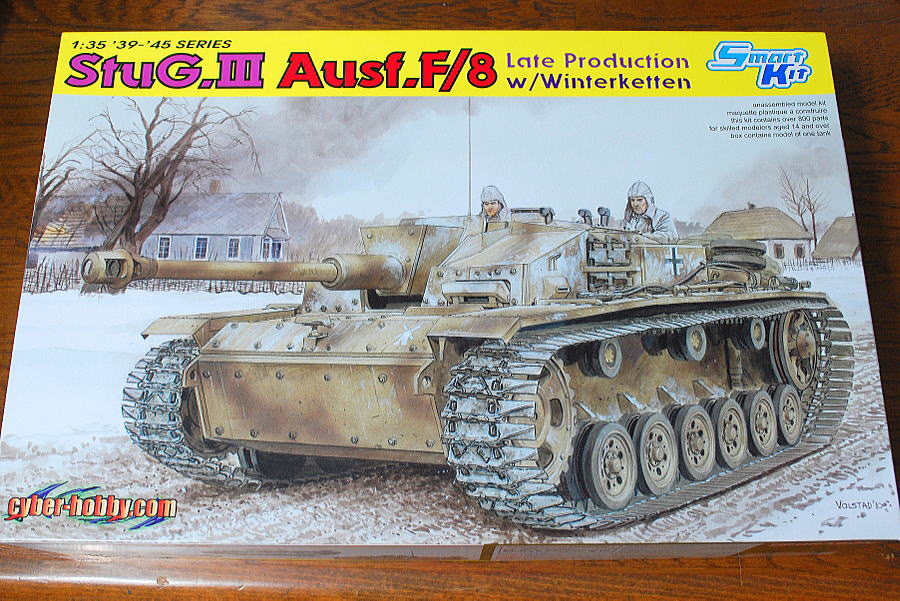 It’s over 95F(35C) degrees or more every day, which is too hot in Tokyo; I choose an excellent package of Stug III. It is the fundamentally same design as the Stug III type G, which I made before.
It’s over 95F(35C) degrees or more every day, which is too hot in Tokyo; I choose an excellent package of Stug III. It is the fundamentally same design as the Stug III type G, which I made before.
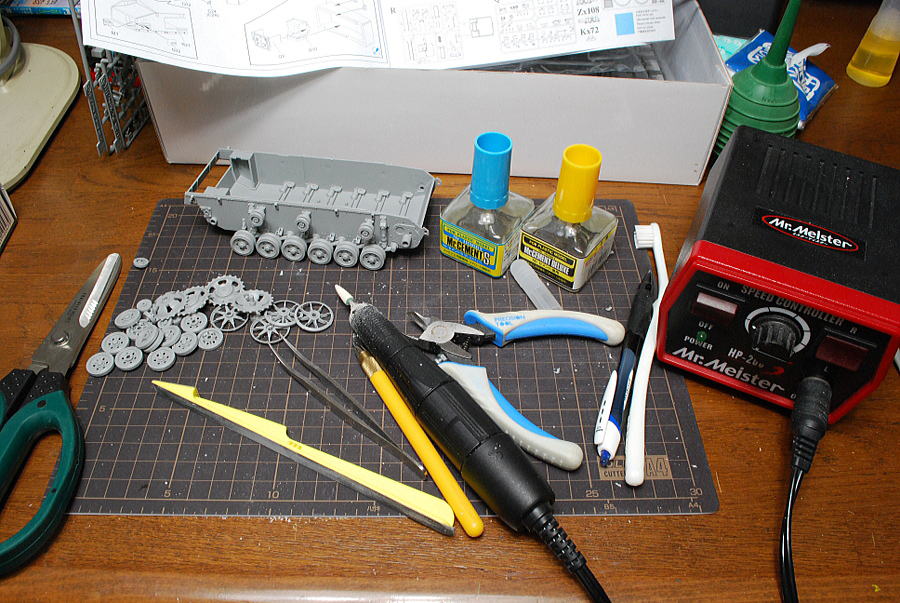 The chassis and wheels are under-making. I used a motor tool for sanding; work will progress efficiently. I worked with handling so many parting lines and routine work while listening to my favorite music.
The chassis and wheels are under-making. I used a motor tool for sanding; work will progress efficiently. I worked with handling so many parting lines and routine work while listening to my favorite music.
(14-August-2013)
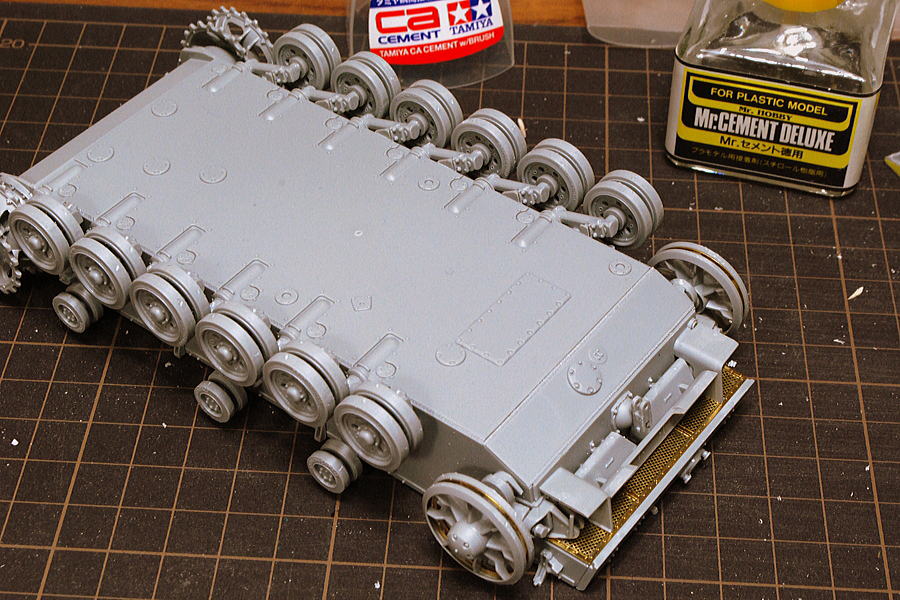 The chassis was completed. Etching parts are used for idler wheels and rear parts. Dragon does not cut corners on the not visible area.
The chassis was completed. Etching parts are used for idler wheels and rear parts. Dragon does not cut corners on the not visible area.
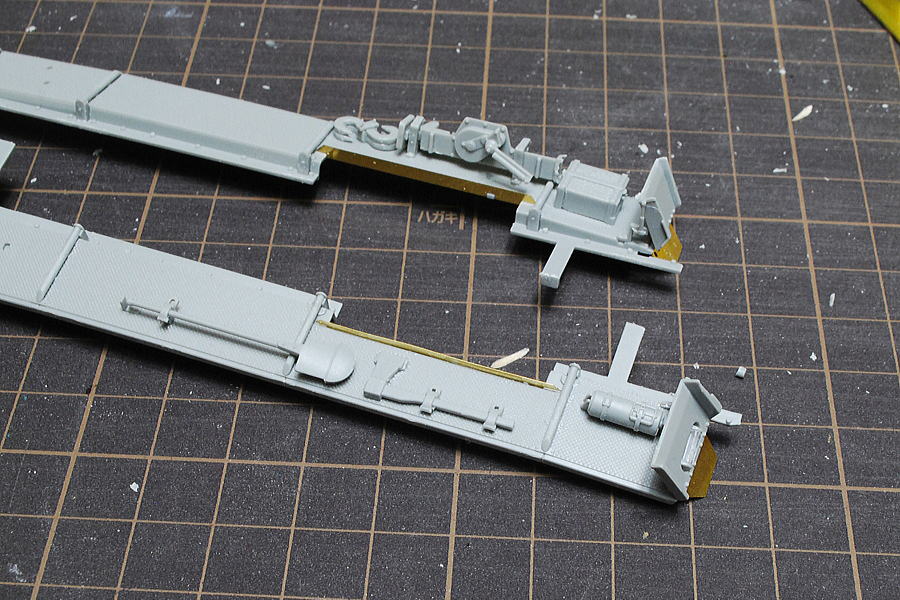 The rear fender of both sides is flipping up. Although there were incorrect notations and not much detailed explanation in the instruction manual, I interpreted it suitably and assembled it.
The rear fender of both sides is flipping up. Although there were incorrect notations and not much detailed explanation in the instruction manual, I interpreted it suitably and assembled it.
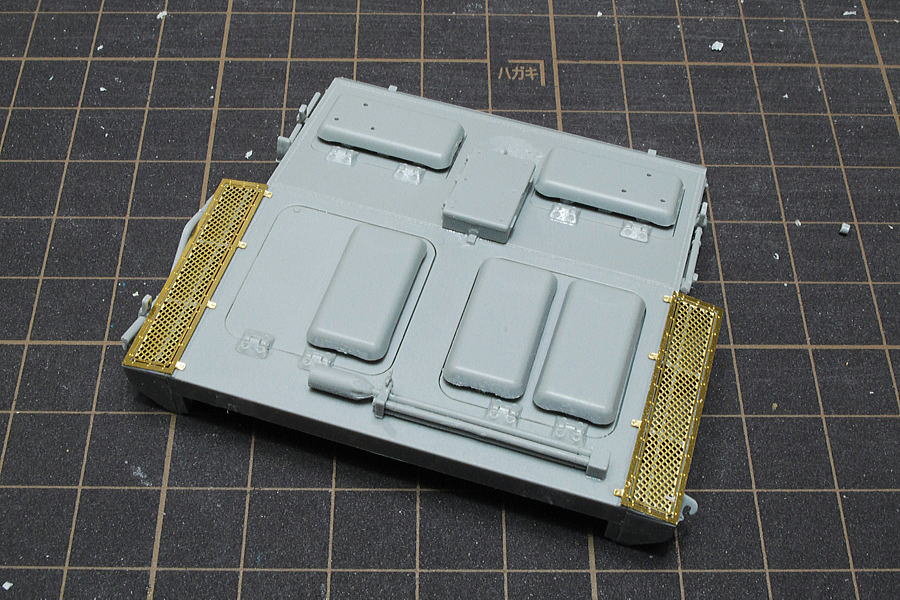 Although there was an omission of hinge parts directions on instruction, covered with my imagination…
Although there was an omission of hinge parts directions on instruction, covered with my imagination…
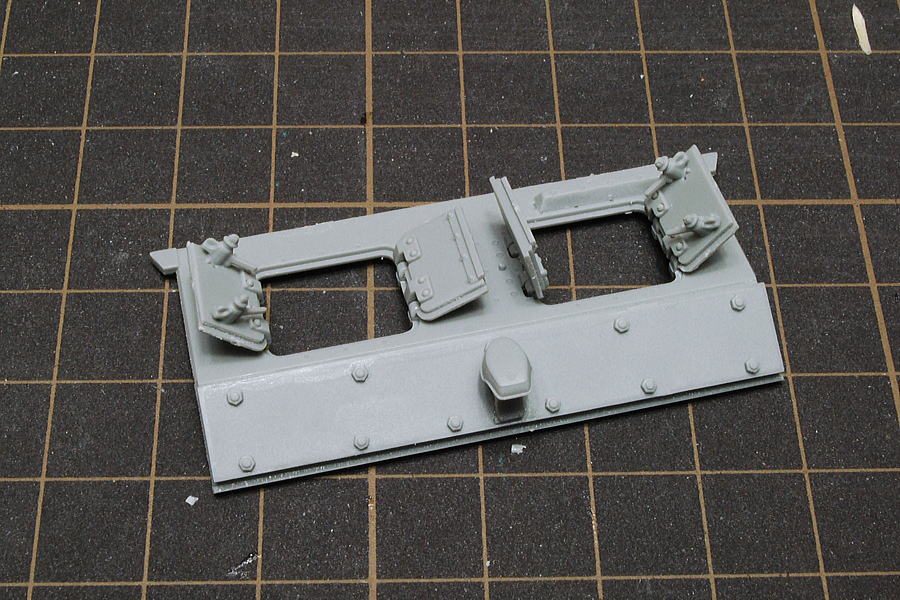 There are locking parts of the hatch reverse side. If I adhere, it’s a waste; I change the hatches to the movable state. It’s pretty realistic.
There are locking parts of the hatch reverse side. If I adhere, it’s a waste; I change the hatches to the movable state. It’s pretty realistic.
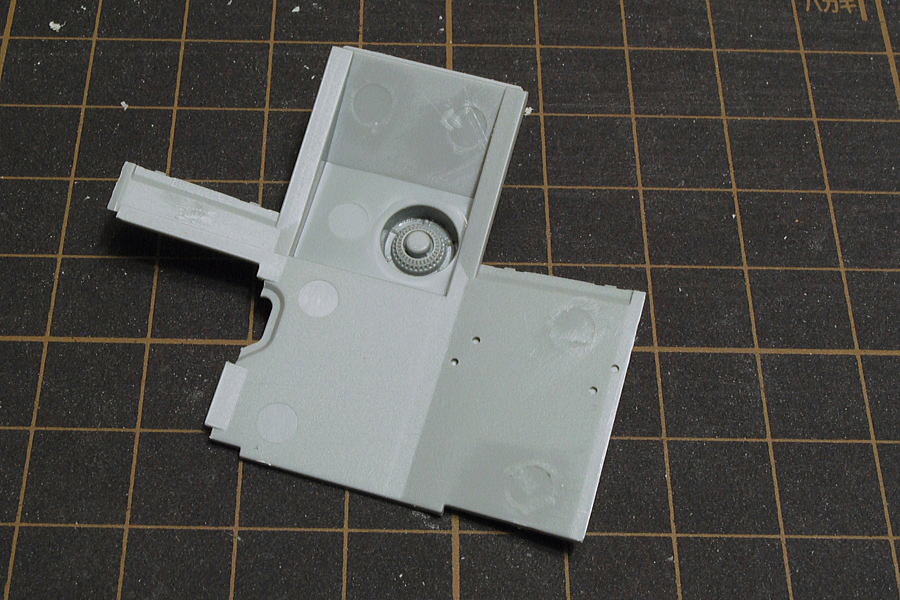 It is a ventilator, which carries out the gun smoke at the time of the fire, attached at the top of the fighting compartment. It will not be shown if this portion is made ordinarily, but it’s excellent!
It is a ventilator, which carries out the gun smoke at the time of the fire, attached at the top of the fighting compartment. It will not be shown if this portion is made ordinarily, but it’s excellent!
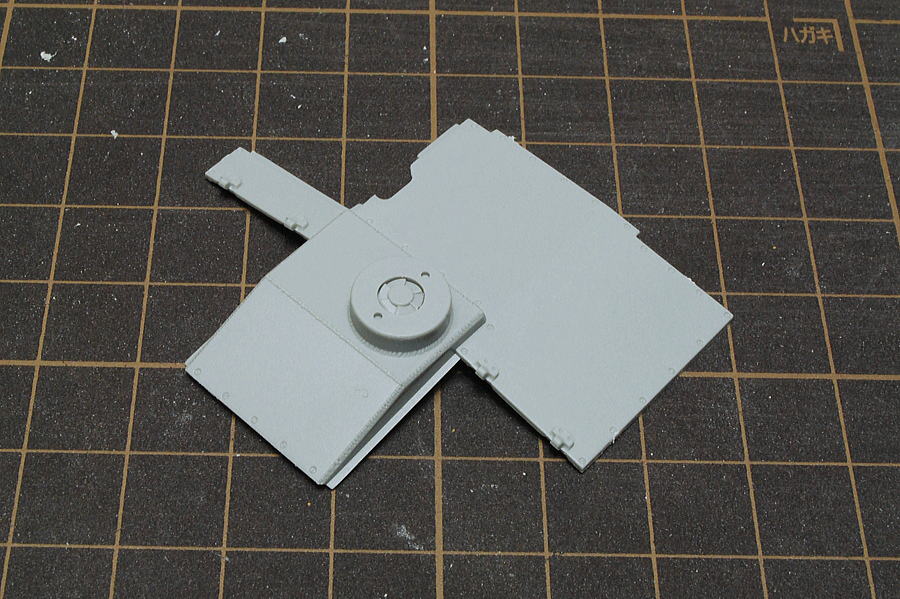 The exhaust fan is also reproduced on the upper part of the ventilator mentioned above. Since a cover is attached, it is not usually visible. I think some of the labor of this craftsmanship may be applied to the reconfirmation of assembly instructions. The kit itself is the highest.
The exhaust fan is also reproduced on the upper part of the ventilator mentioned above. Since a cover is attached, it is not usually visible. I think some of the labor of this craftsmanship may be applied to the reconfirmation of assembly instructions. The kit itself is the highest.
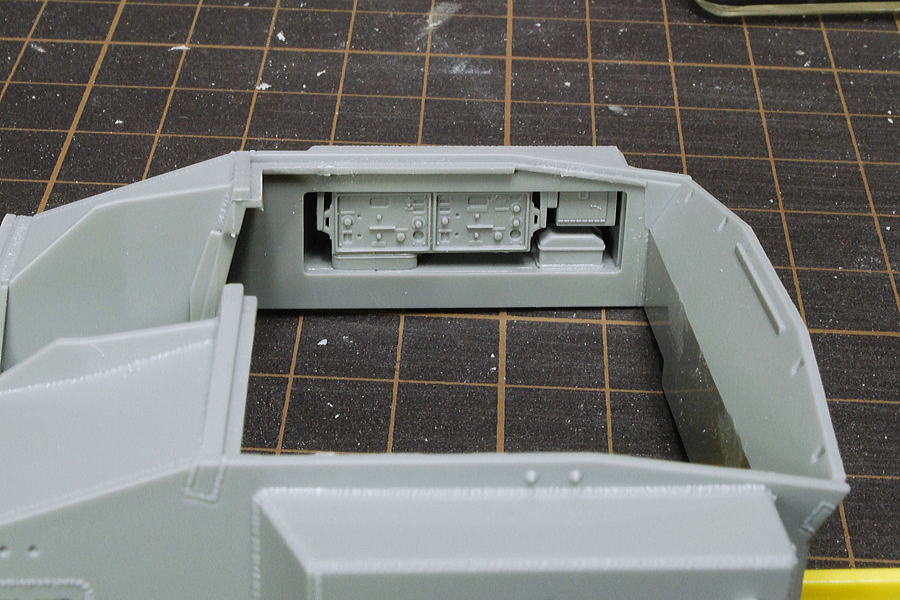 The radio is on the right side of the fighting compartment. It’s brilliant; I wonder how much is visible through the top wide hatch.
The radio is on the right side of the fighting compartment. It’s brilliant; I wonder how much is visible through the top wide hatch.
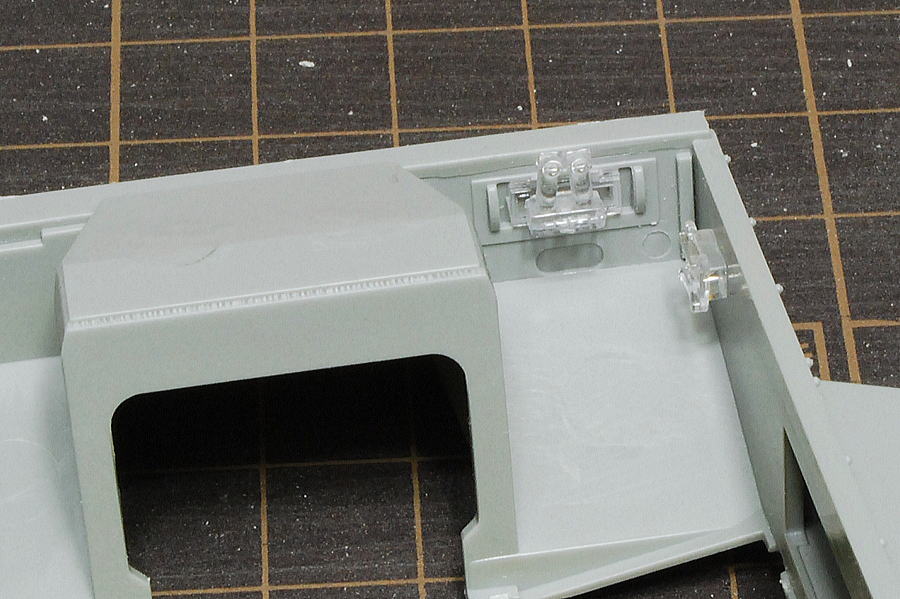 Although it is an accessible peephole when it sees from the outside, it is interesting that it turns out that the inner side is such a mechanism. The inner sides of the periscopes are transparent parts. Since the square of a working mat is 1 cm, they are tiny parts.
Although it is an accessible peephole when it sees from the outside, it is interesting that it turns out that the inner side is such a mechanism. The inner sides of the periscopes are transparent parts. Since the square of a working mat is 1 cm, they are tiny parts.
(16-August-2013)
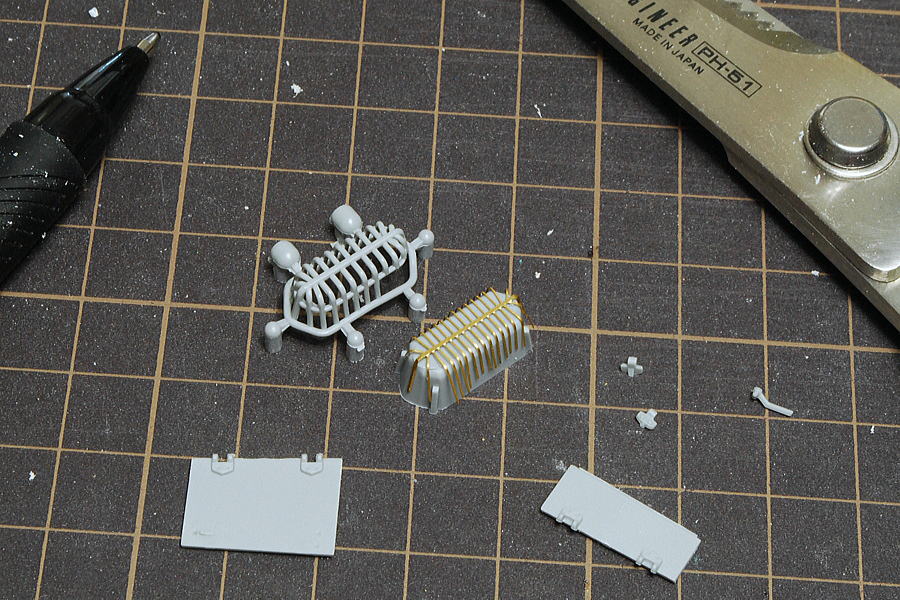 It is a wire net that prevents hand grenade throwing in by the enemy. We can choose injection and photo-etched parts, both preferred. Injection part handling is more accessible, but I chose to etch here in response to the spirit of Dragon Models.
It is a wire net that prevents hand grenade throwing in by the enemy. We can choose injection and photo-etched parts, both preferred. Injection part handling is more accessible, but I chose to etch here in response to the spirit of Dragon Models.
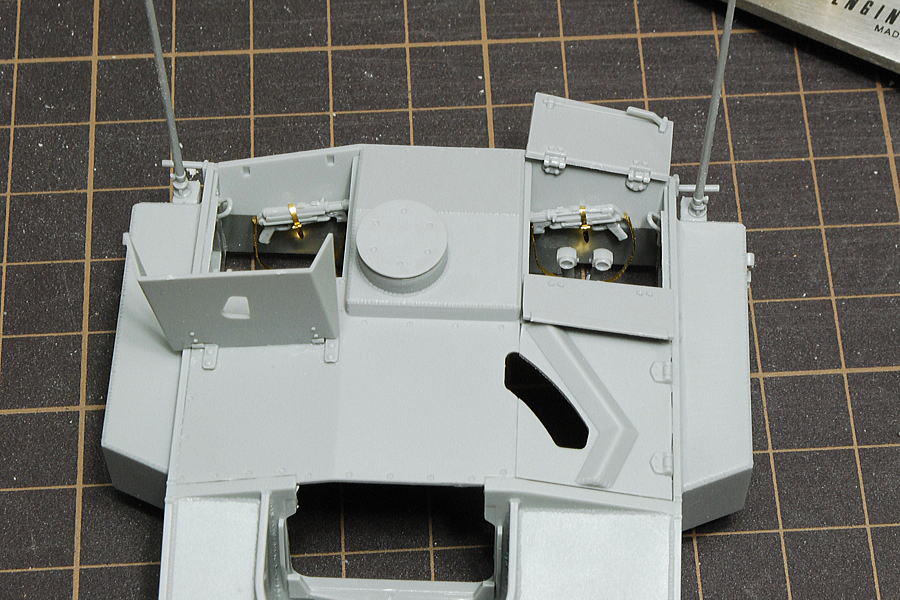 Attached are the strap and fastener belt of the etching part with the submachine guns. Since the junction to the antenna base is very weak, I used a brass line inside the antenna and raised the adhesion intensity.
Attached are the strap and fastener belt of the etching part with the submachine guns. Since the junction to the antenna base is very weak, I used a brass line inside the antenna and raised the adhesion intensity.
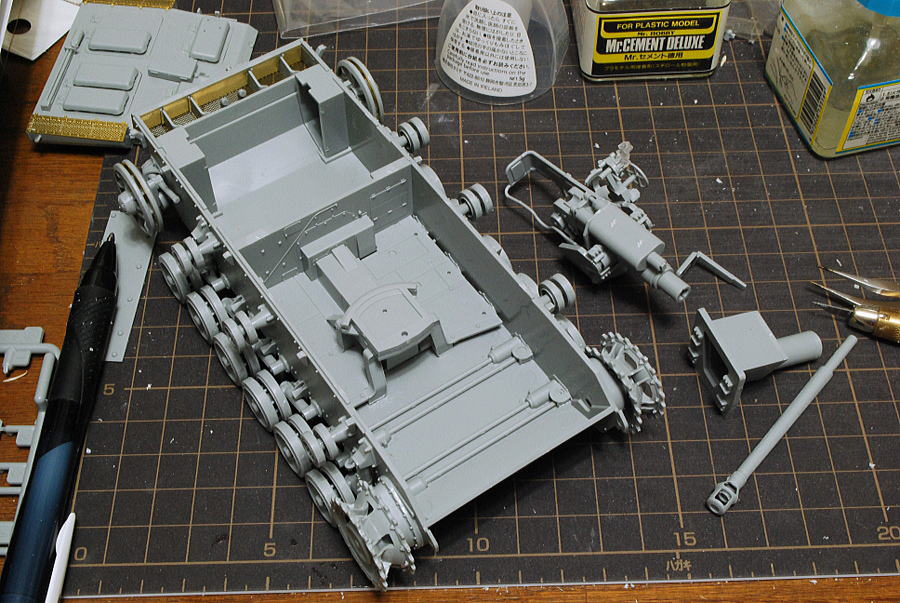 Working inside the combat room. Although a procedure is different from this instruction, it assembled quickly. Main gun parts will be covered in almost area, and no-show, not-so-strict finishing is needed.
Working inside the combat room. Although a procedure is different from this instruction, it assembled quickly. Main gun parts will be covered in almost area, and no-show, not-so-strict finishing is needed.
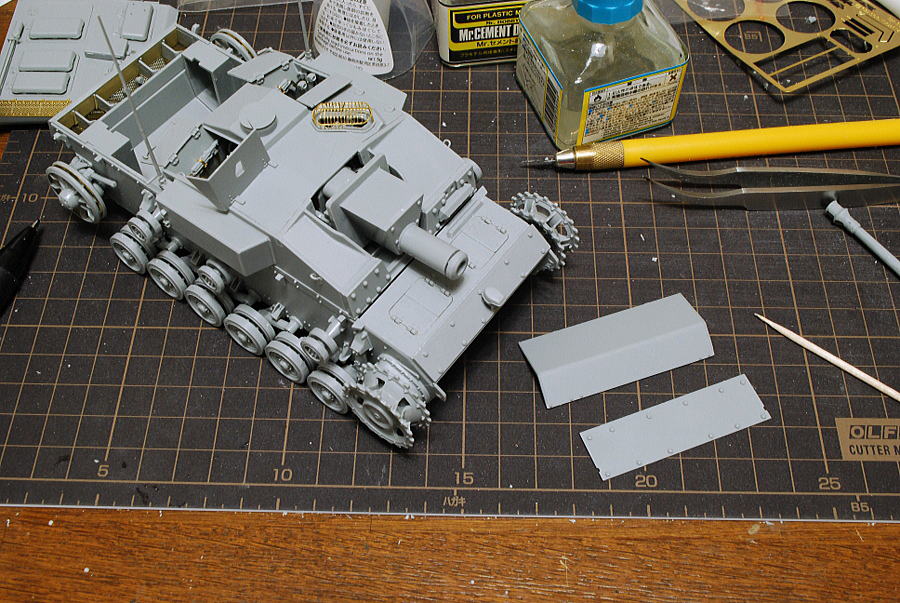 Attachment directions of the D11 front armor part were missed on the instruction; I did not notice in the last. Now only a machine gun shield is attached. There’s no direction, but the parts are in the box. I wonder about the machine gun. The dragon’s kit has so many parts and no-used parts, I don’t know how to do it, but I will consider it later.
Attachment directions of the D11 front armor part were missed on the instruction; I did not notice in the last. Now only a machine gun shield is attached. There’s no direction, but the parts are in the box. I wonder about the machine gun. The dragon’s kit has so many parts and no-used parts, I don’t know how to do it, but I will consider it later.
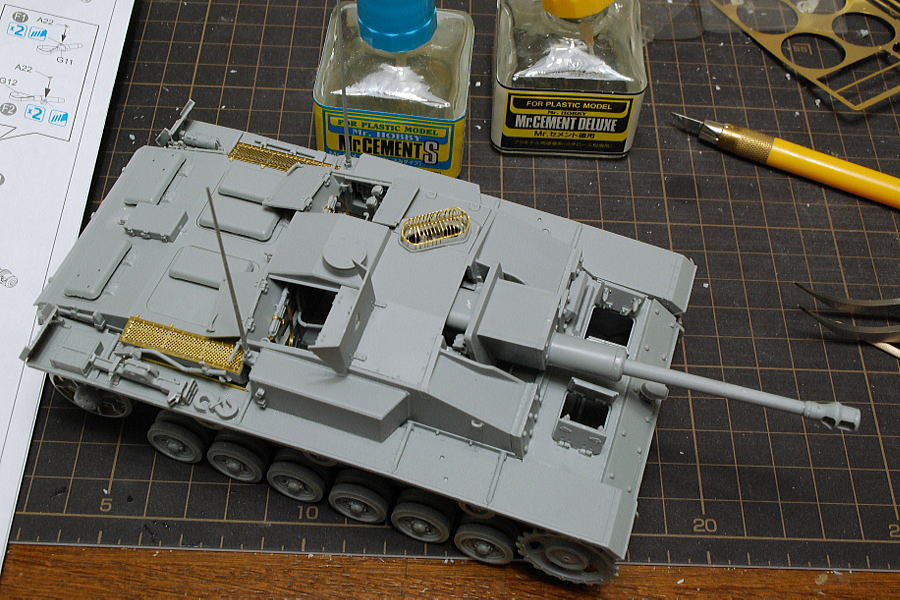 I wouldn’t say I like finishing up some modules to one at the last point, with a fender on either side and the front part, a central fighting compartment, and a rear part because I’m worried those modules are united into one tank with no mistakes. The last process is pretty severe, delicate, and complex…
I wouldn’t say I like finishing up some modules to one at the last point, with a fender on either side and the front part, a central fighting compartment, and a rear part because I’m worried those modules are united into one tank with no mistakes. The last process is pretty severe, delicate, and complex…
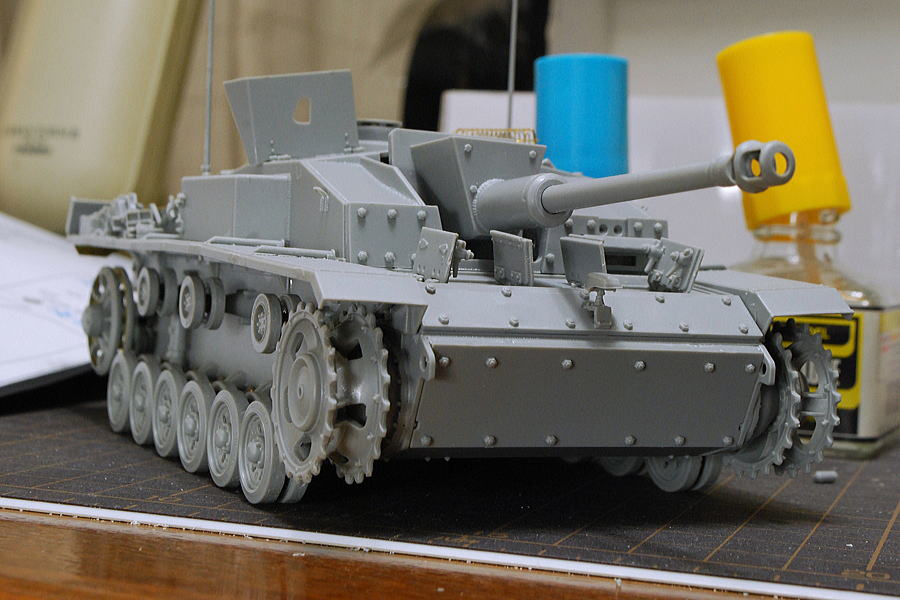 It will be completed assembling after I attach some parts and the caterpillar is rolled. Seeing from here, there is a volume of front armoring considerable.
It will be completed assembling after I attach some parts and the caterpillar is rolled. Seeing from here, there is a volume of front armoring considerable.
How do I paint the inside of this tank? I should have painted the inside in white, at least. Many hatches are opened. Or I am attaching a figure to cover all the hatches.
(18-August-2013)
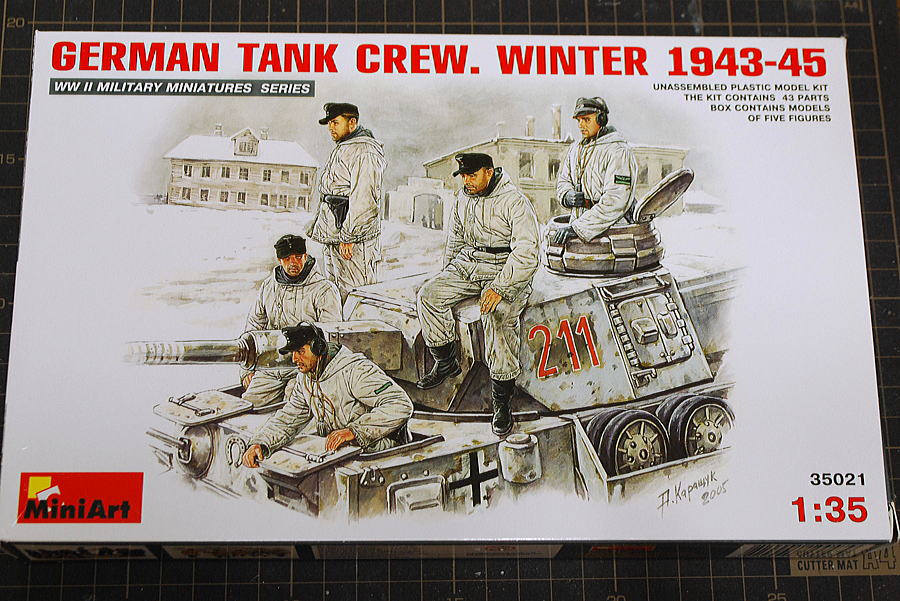 The tank assembly was almost completed. I’ll start to figure out a change of air. It’s Miniart German Tank Crew Winter 1943-45. This picture advises to fit Panzer IV, but I use them for Stug III.
The tank assembly was almost completed. I’ll start to figure out a change of air. It’s Miniart German Tank Crew Winter 1943-45. This picture advises to fit Panzer IV, but I use them for Stug III.
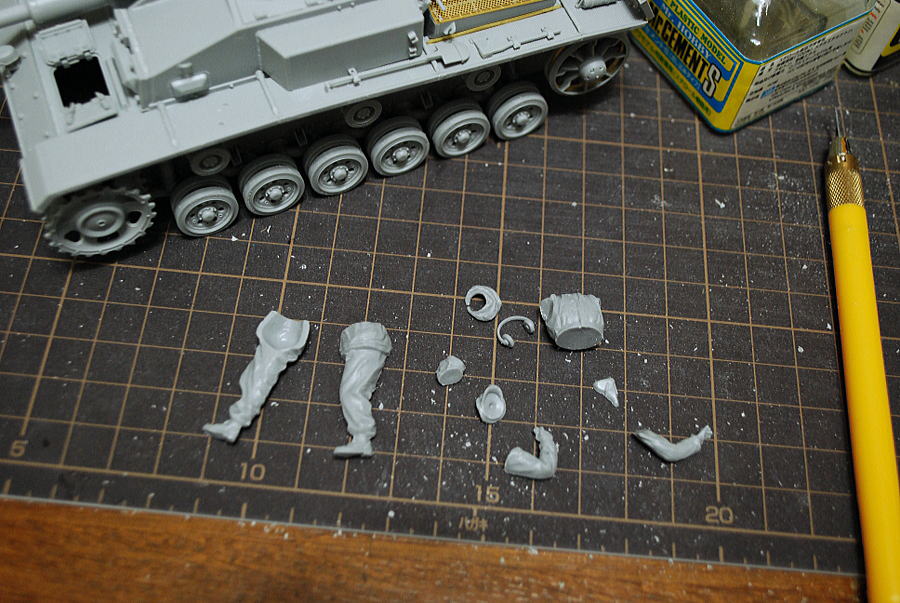 This kit has hard points to assemble. Some of them are heavy winter clothing, and their winter hood is not fit. I take a suitable position and correct the form and gap with putty.
This kit has hard points to assemble. Some of them are heavy winter clothing, and their winter hood is not fit. I take a suitable position and correct the form and gap with putty.
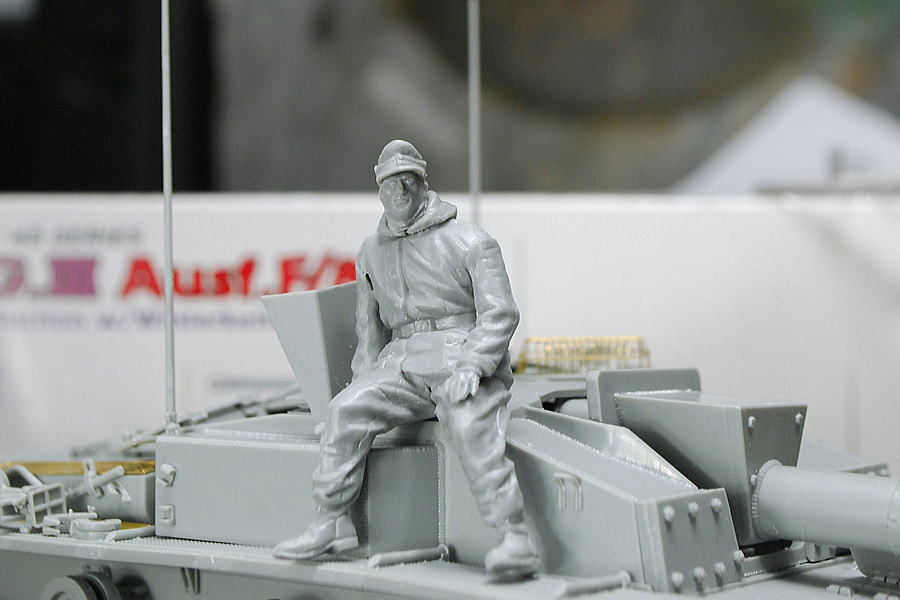 The first figure is now a relaxed mode. Not yet fixed the gap. It’s like wearing a ski suit.
The first figure is now a relaxed mode. Not yet fixed the gap. It’s like wearing a ski suit.
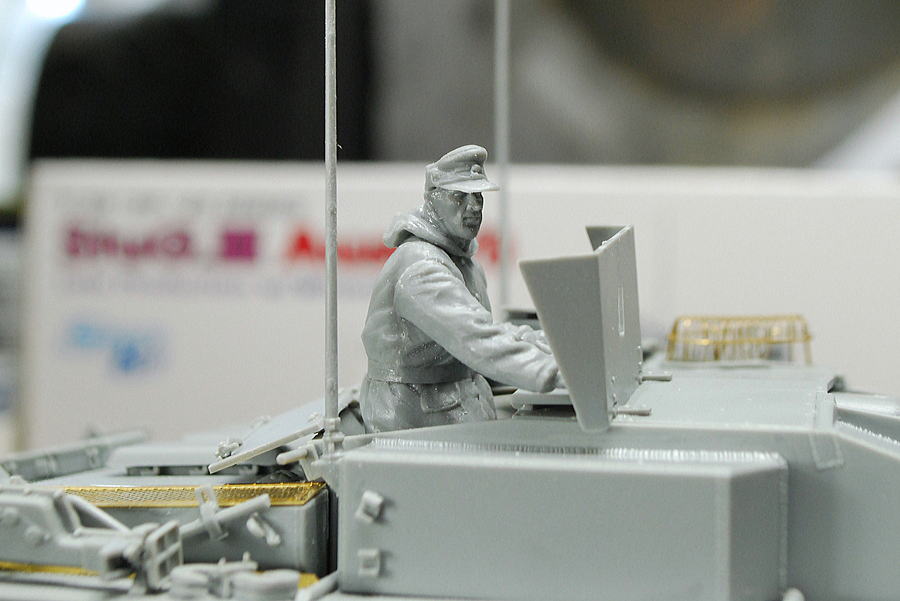 2nd figure is looking out for the circumference just for a moment.
2nd figure is looking out for the circumference just for a moment.
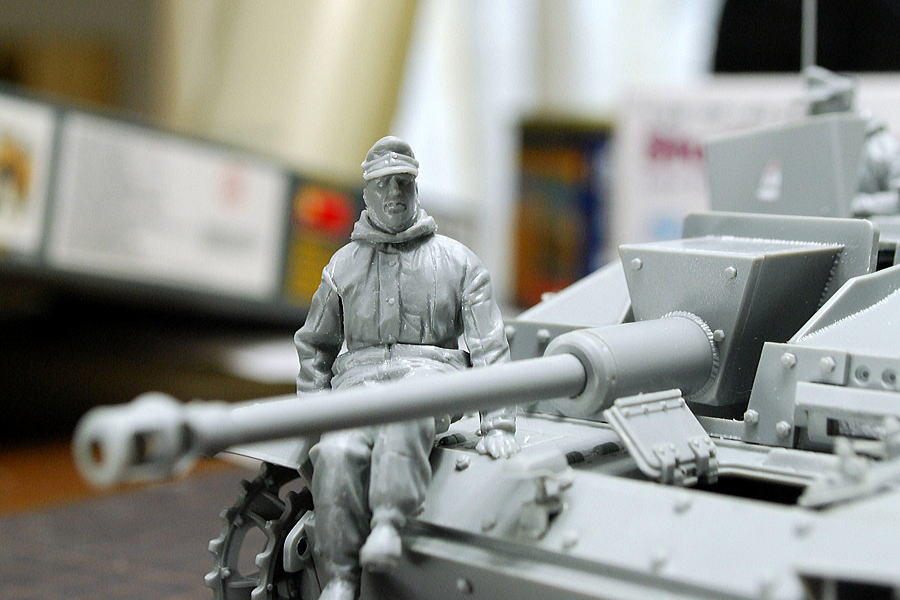 The 3rd one. Since there is no place to fit this pose, he is sitting here forcibly. I think all figures do not need to fit this Stug III cause like an accessories level for this tank. In case we need a complete fit, there’s a necessity for reconstruction somewhat.
The 3rd one. Since there is no place to fit this pose, he is sitting here forcibly. I think all figures do not need to fit this Stug III cause like an accessories level for this tank. In case we need a complete fit, there’s a necessity for reconstruction somewhat.
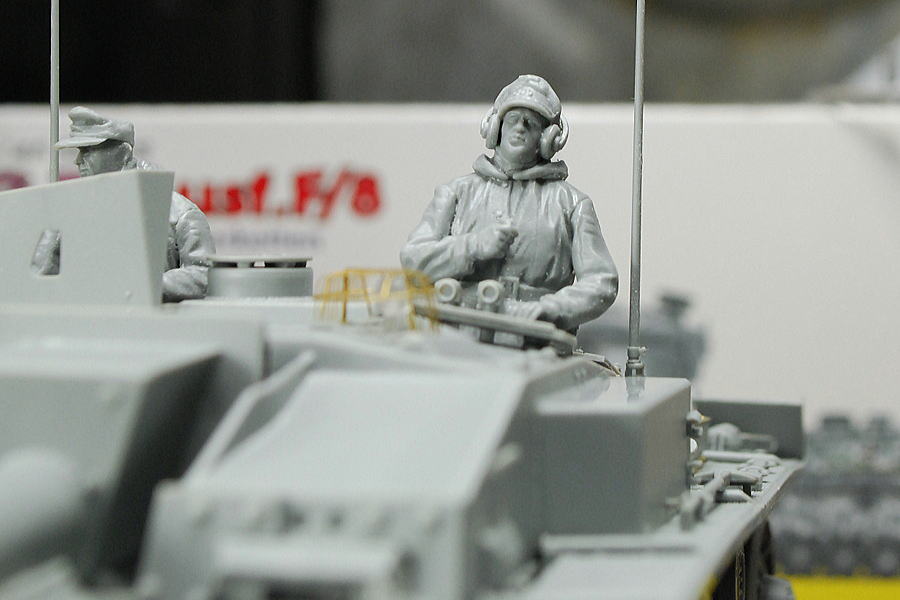 An officer with headphones bossy attitude. I need a headphone code set up later.
An officer with headphones bossy attitude. I need a headphone code set up later.
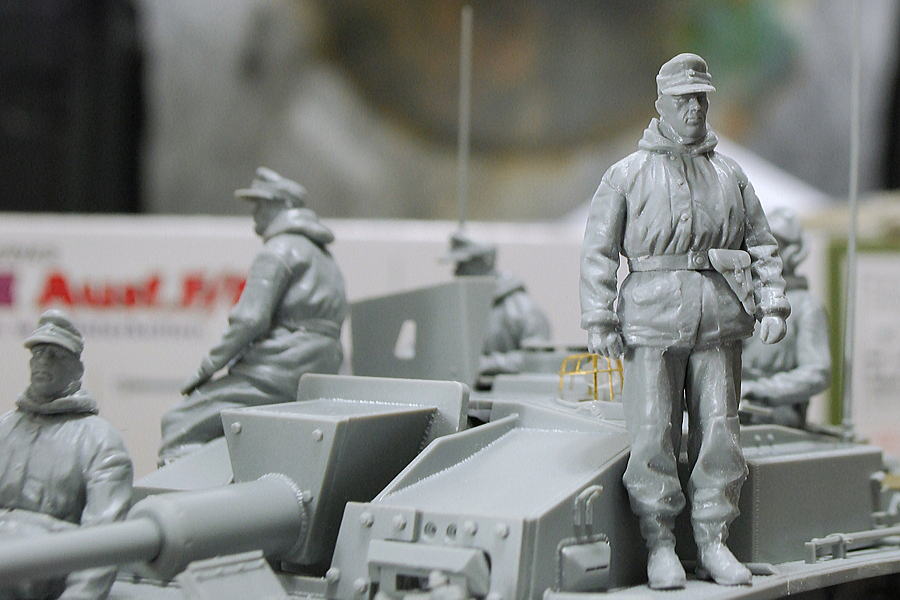 Just a standing figure. It seems all the crew is scattered on the tank. I consider it’s the time at leisure, so no problem…
Just a standing figure. It seems all the crew is scattered on the tank. I consider it’s the time at leisure, so no problem…
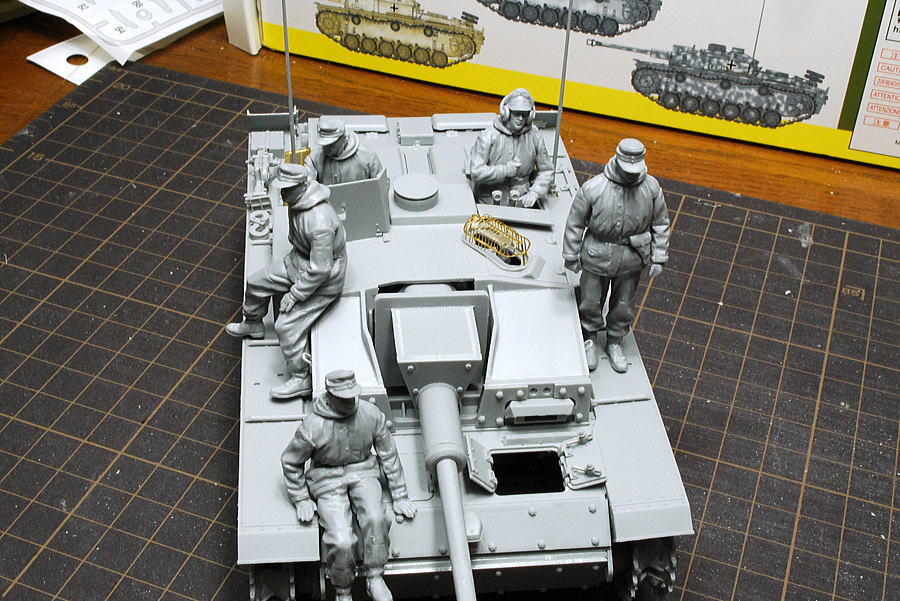 Although all four crews are at the Stug III assault gun, I have made five crews in concentration. OK, one person is from another tank and comes to a chat. It is a fundamentally relaxed atmosphere.
Although all four crews are at the Stug III assault gun, I have made five crews in concentration. OK, one person is from another tank and comes to a chat. It is a fundamentally relaxed atmosphere.
(27-August-2013)
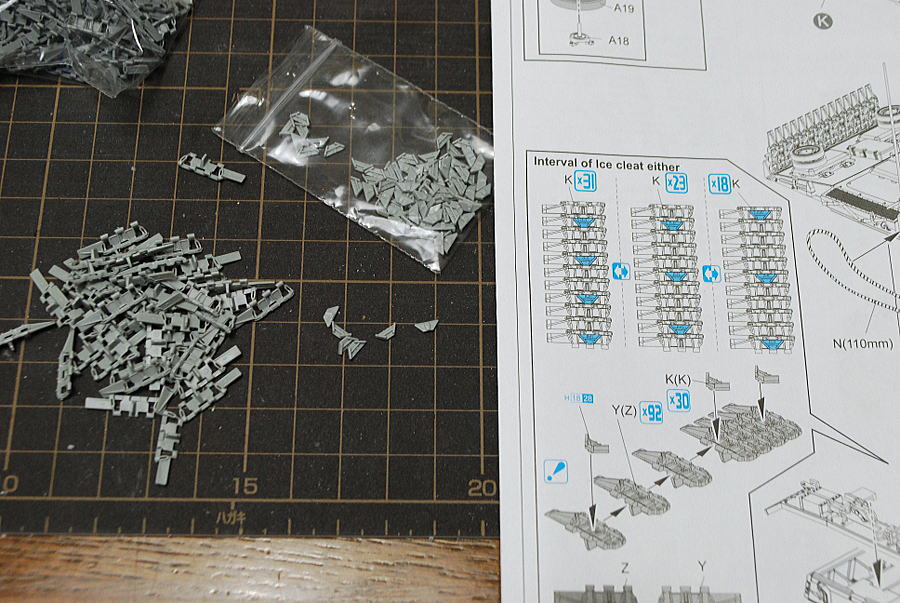 We can choose the interval of ice cleats as per the instruction. For one ice cleat, I chose the narrowest interval, every three caterpillars.
We can choose the interval of ice cleats as per the instruction. For one ice cleat, I chose the narrowest interval, every three caterpillars.
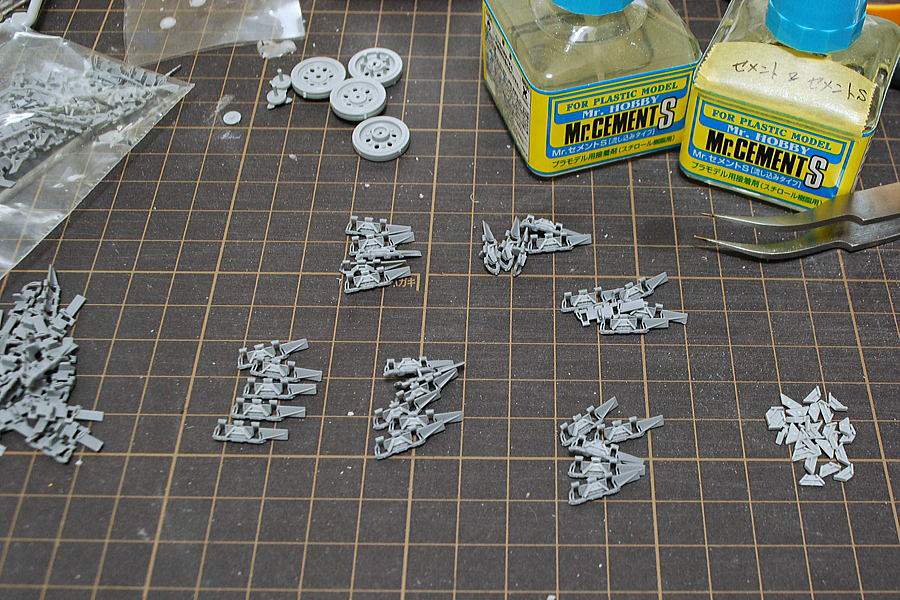 I used about 60 ice cleats and another 20 extra. In case you use it for a spare caterpillar, needed 14 cleats.
I used about 60 ice cleats and another 20 extra. In case you use it for a spare caterpillar, needed 14 cleats.
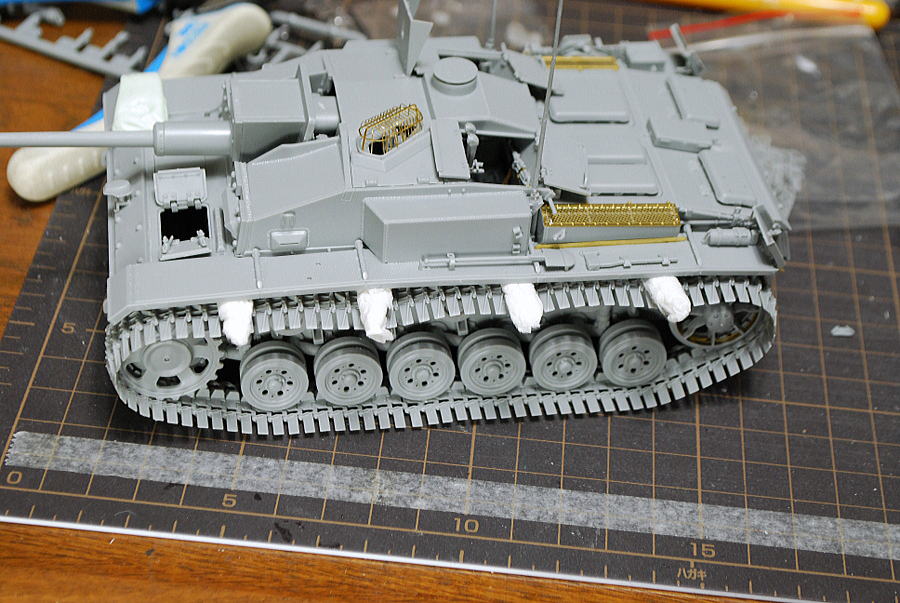 Lovely pace working, and I feel good! But you can see I made the same mistake before my Stug III. Yes, the caterpillar was attached reversal… I’m very sorry, what should I do…
Lovely pace working, and I feel good! But you can see I made the same mistake before my Stug III. Yes, the caterpillar was attached reversal… I’m very sorry, what should I do…
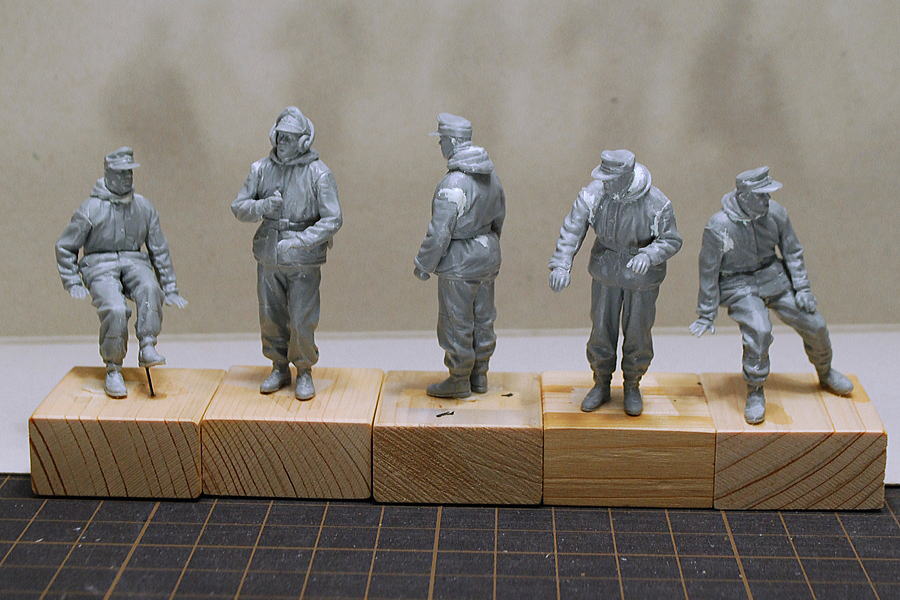 I’m confused, but these figures should be painted and prepared to set up on the base.
I’m confused, but these figures should be painted and prepared to set up on the base.
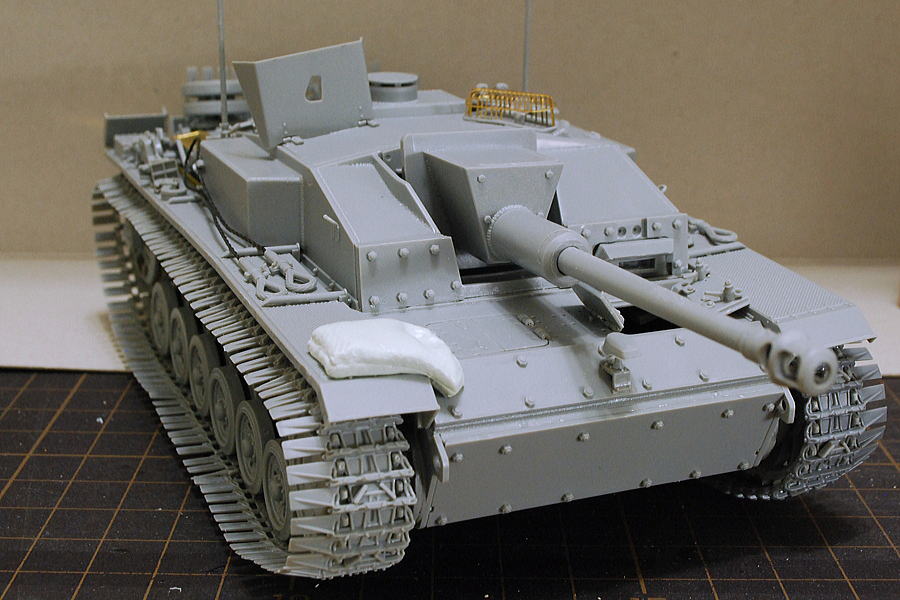 It’s major surgery, the right and left caterpillars were peeled away while pouring in adhesives, and some minor road wheels were broken. After that, I used a lot of adhesives to make a soft caterpillar fit sprocket and idler wheels.
It’s major surgery, the right and left caterpillars were peeled away while pouring in adhesives, and some minor road wheels were broken. After that, I used a lot of adhesives to make a soft caterpillar fit sprocket and idler wheels.
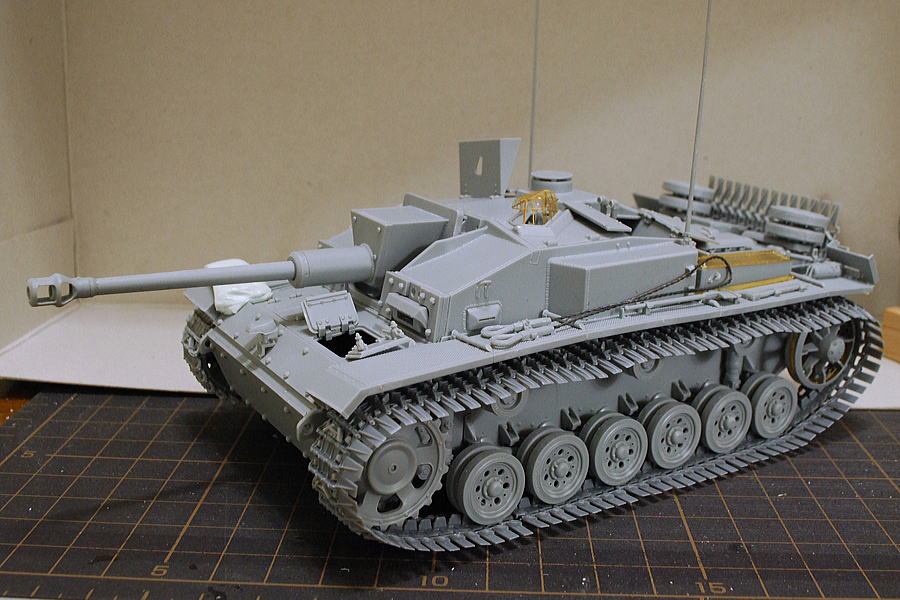 Dragon Models classifies the caterpillar on either side by color to deep gray and thin gray for right and left because there are fellows who make such mistakes.
Dragon Models classifies the caterpillar on either side by color to deep gray and thin gray for right and left because there are fellows who make such mistakes.
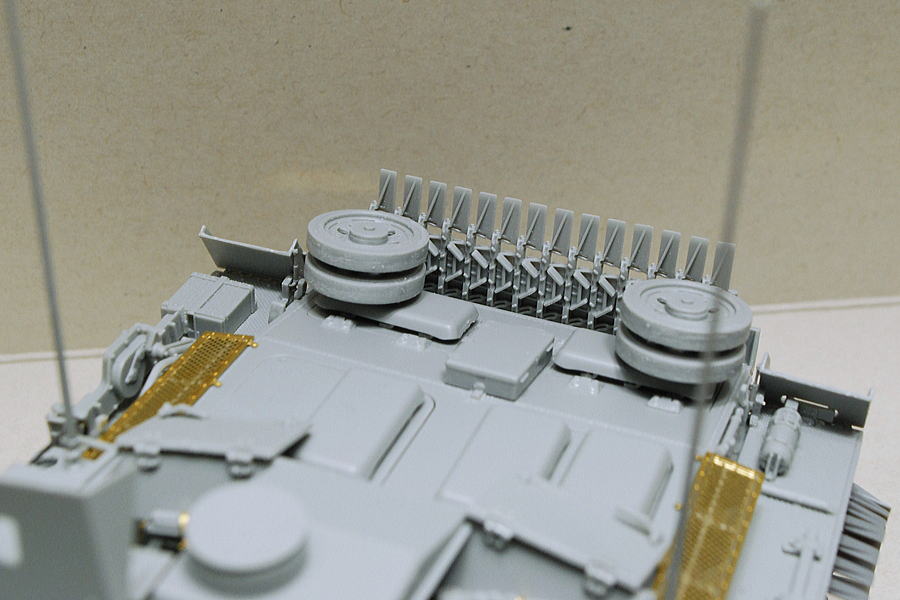 Spare caterpillar and spare road wheels.
Spare caterpillar and spare road wheels.
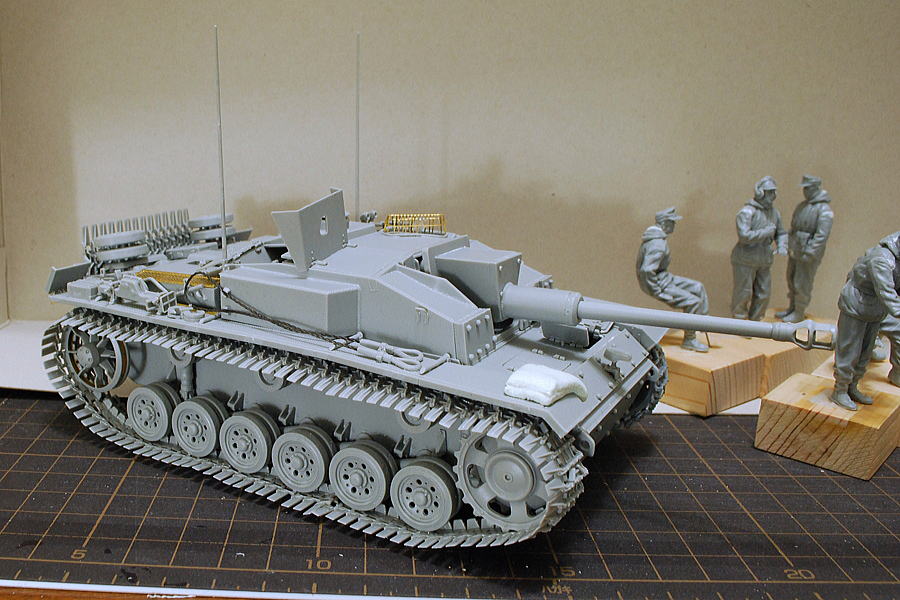 It’s low vehicle height and nice looking.
It’s low vehicle height and nice looking.
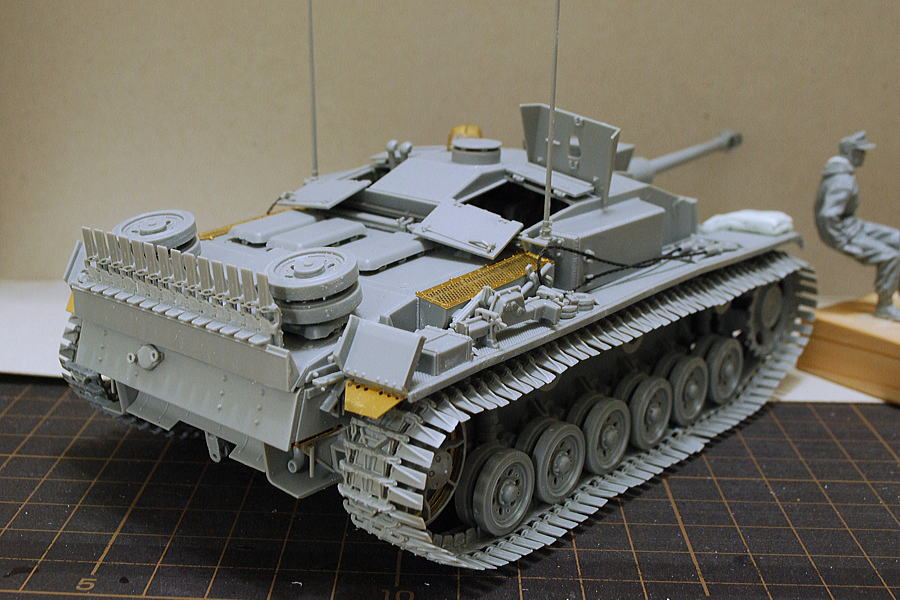 There are some rough points by correction of the caterpillar; it may be able to recover by snowy weathering, etc. I thought it would carry a machine gun, but after amending the mistake, it was all finished; I was depressed.
There are some rough points by correction of the caterpillar; it may be able to recover by snowy weathering, etc. I thought it would carry a machine gun, but after amending the mistake, it was all finished; I was depressed.
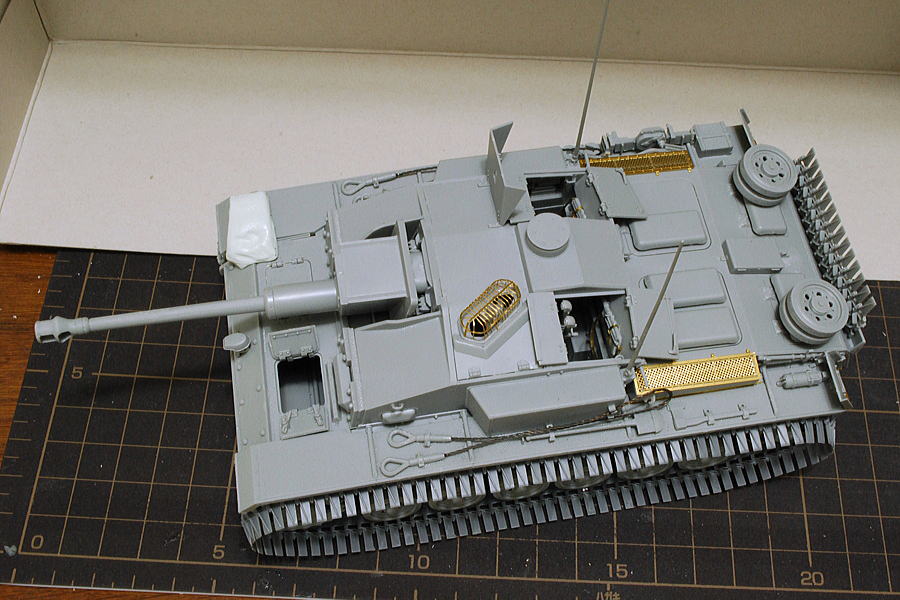 It was having loaded the forward right with the sandbag. Made it like a tank crew’s floor cushion with a poly putty surplus in the correction of the figure. It was the touch that may fit very well. After painting the figure, I put him on the sandbag again.
It was having loaded the forward right with the sandbag. Made it like a tank crew’s floor cushion with a poly putty surplus in the correction of the figure. It was the touch that may fit very well. After painting the figure, I put him on the sandbag again.
(30-August-2013)
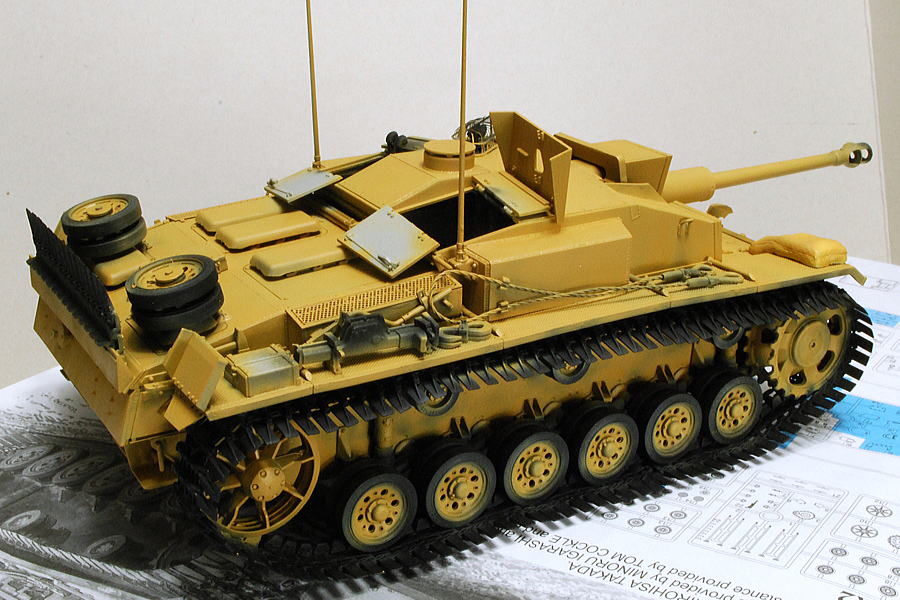 The body base color, the caterpillar, and the rubber wheel were airbrushed. It’s handy to use an airbrush that I can distinguish by different colors.
The body base color, the caterpillar, and the rubber wheel were airbrushed. It’s handy to use an airbrush that I can distinguish by different colors.
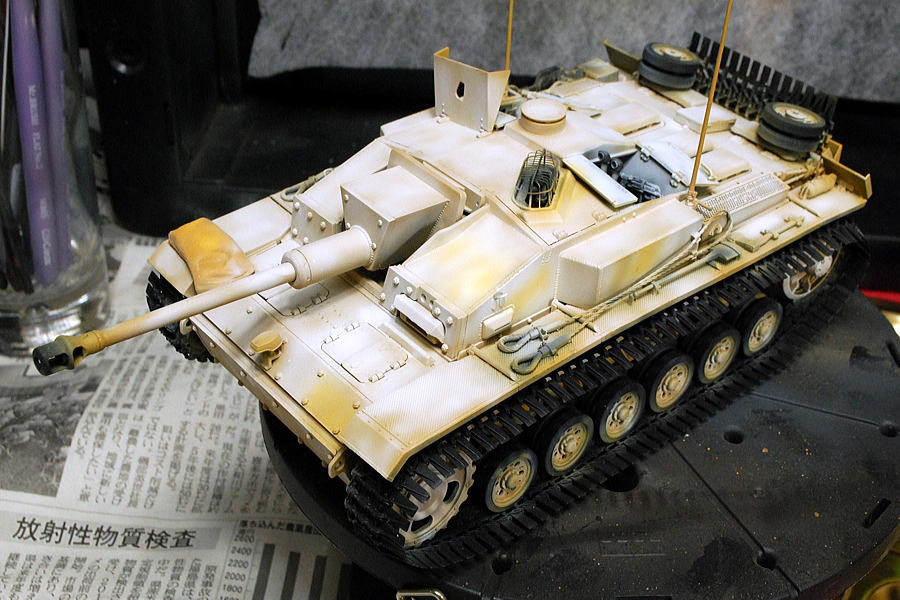 While leaving the body color dark yellow, I blew white thinly to give winter camouflage. Since a unit mark is drawn in white, I remain that point almost dark yellow.
While leaving the body color dark yellow, I blew white thinly to give winter camouflage. Since a unit mark is drawn in white, I remain that point almost dark yellow.
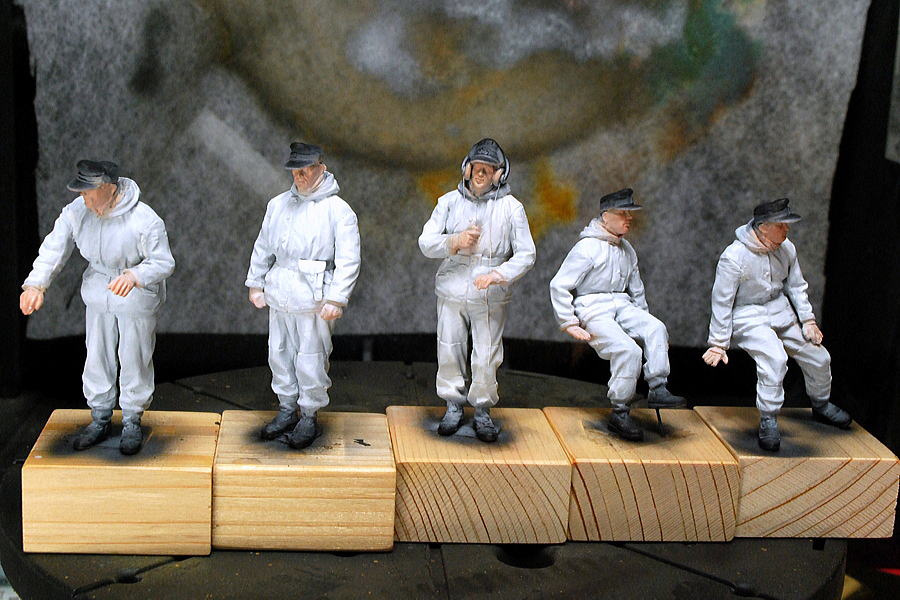 I painted them in white, and the atmosphere of combatant in the snow battle came out at last. Before carrying out the brush painting, I blew Mr. Color paint roughly. So far, the process of vehicle and figure it’s all airbrushing. Seemingly, more detailed painting is required brush paint.
I painted them in white, and the atmosphere of combatant in the snow battle came out at last. Before carrying out the brush painting, I blew Mr. Color paint roughly. So far, the process of vehicle and figure it’s all airbrushing. Seemingly, more detailed painting is required brush paint.
(15-September-2013)
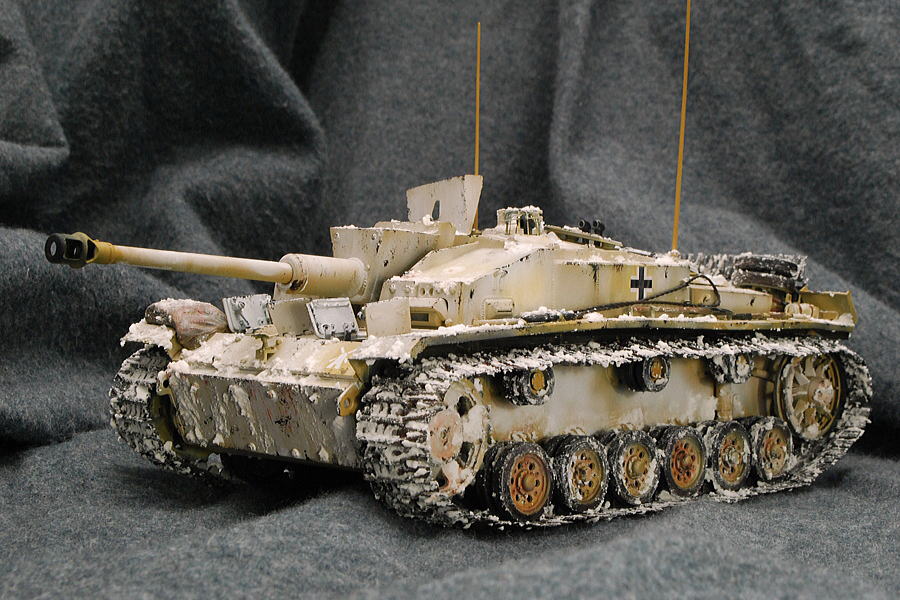 Although I was busy recently and had no time to make this kit, I pumped up myself and completed it now. I’m not disheartened by the correction of mistook direction of a caterpillar; five figures were also completed.
Although I was busy recently and had no time to make this kit, I pumped up myself and completed it now. I’m not disheartened by the correction of mistook direction of a caterpillar; five figures were also completed.
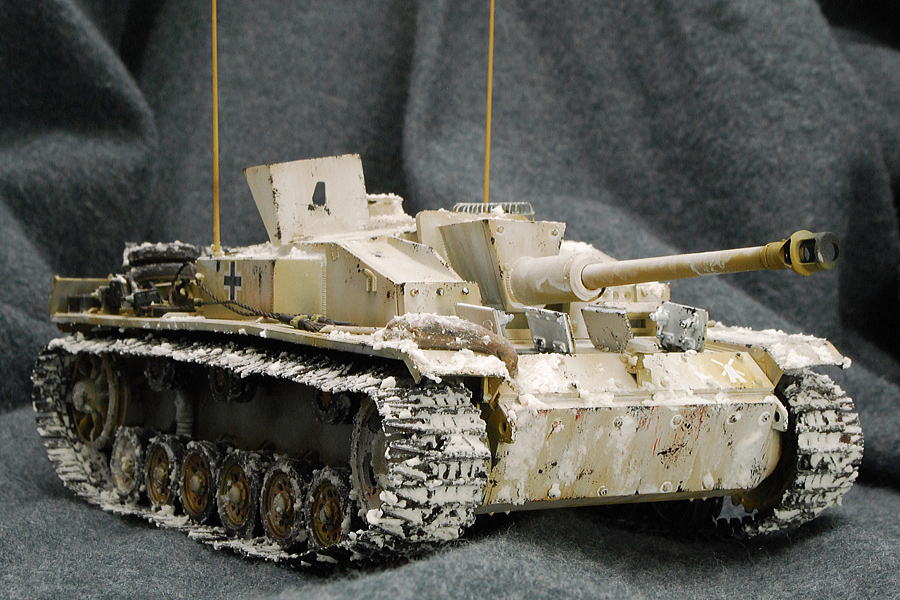 Self-propelled anti-tank gun’s first reason designed to purpose at the beginning is fire support to the infantry soldier who needed direct firepower for trench or pillbox.
Self-propelled anti-tank gun’s first reason designed to purpose at the beginning is fire support to the infantry soldier who needed direct firepower for trench or pillbox.
The target is shifted to enemy tanks; this model has a shallow height and is good at ambush attacks.
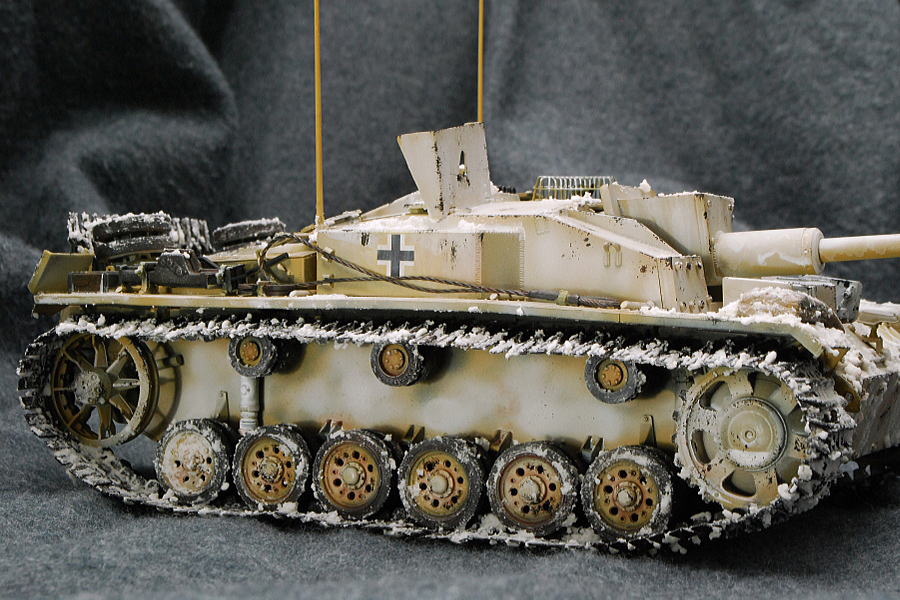 After washing in white, I also tried to perform in gray, but the tank became dirty too much, and I stopped it, only whitewashing is good this time, I suppose. Changing was attached in the portion on which camouflage paint and snow are piling up.
After washing in white, I also tried to perform in gray, but the tank became dirty too much, and I stopped it, only whitewashing is good this time, I suppose. Changing was attached in the portion on which camouflage paint and snow are piling up.
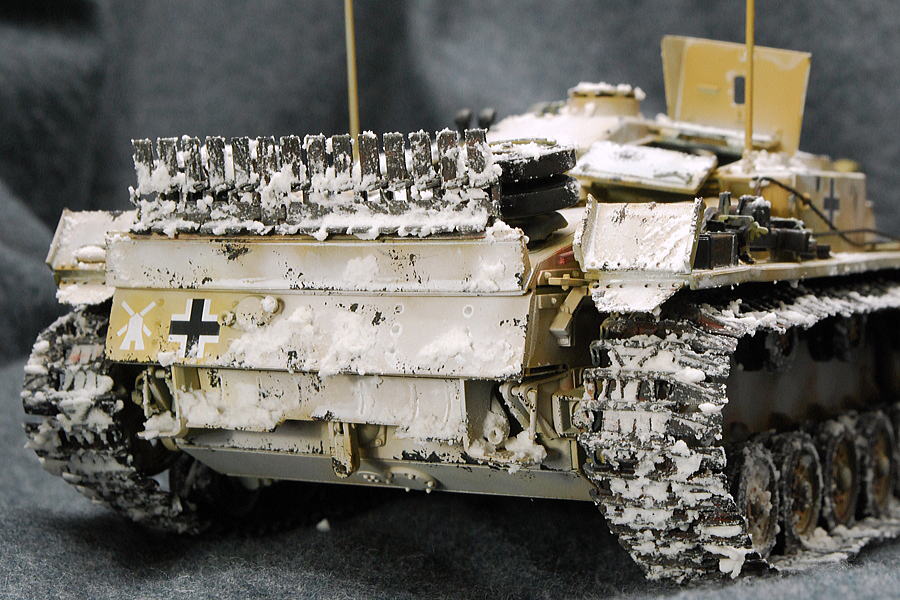 I image light, smooth snow powdery snow; I choose the sight texture paint of Tamiya color, which is easy to use. If I clean up my brush before drying, it will not be crumbed up.
I image light, smooth snow powdery snow; I choose the sight texture paint of Tamiya color, which is easy to use. If I clean up my brush before drying, it will not be crumbed up.
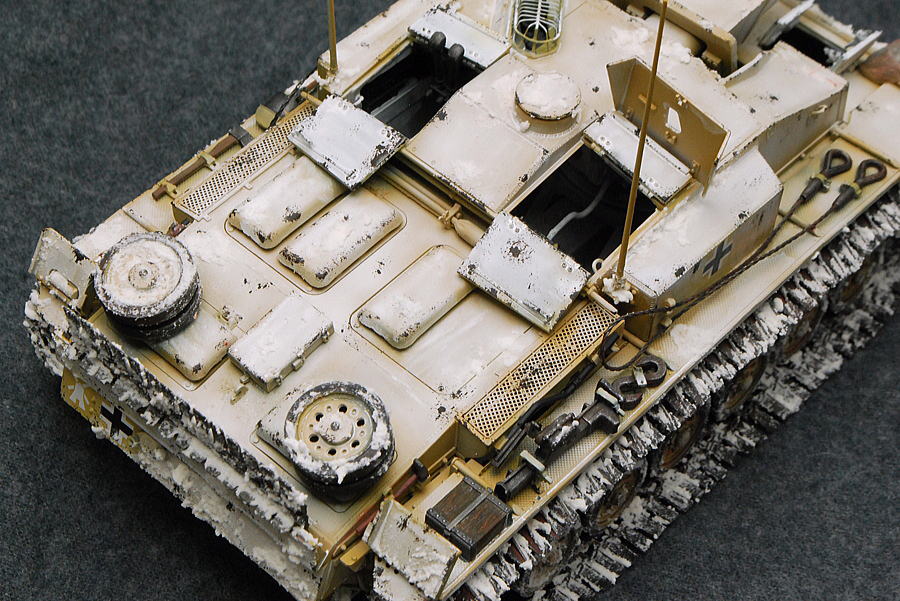 It’s narrow set the figure in a fighting compartment. Probably, the crew also suffered in the pretty narrow vehicles.
It’s narrow set the figure in a fighting compartment. Probably, the crew also suffered in the pretty narrow vehicles.
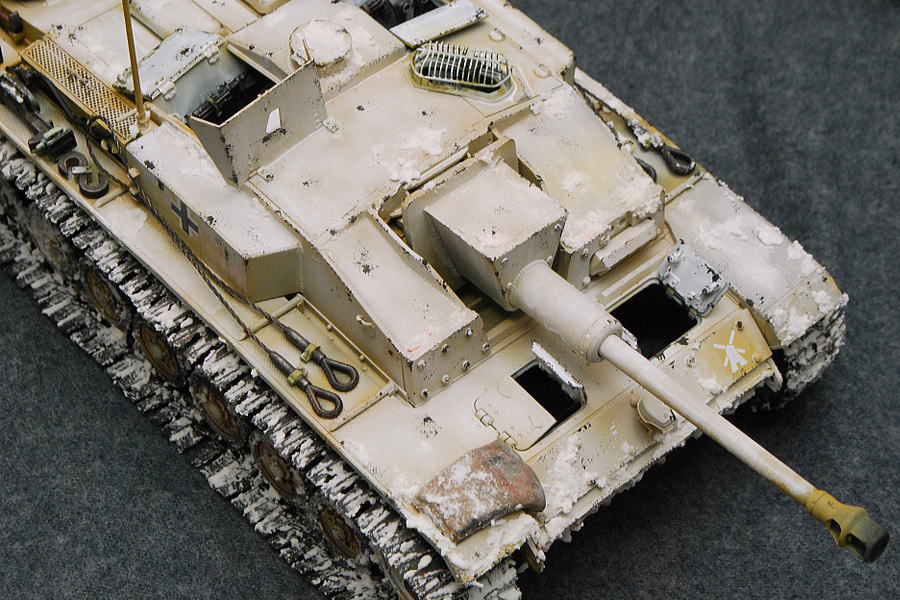 According to the instruction manual, marking is the 901st assault gun brigade’s 1943 in Kharkov, Russia.
According to the instruction manual, marking is the 901st assault gun brigade’s 1943 in Kharkov, Russia.
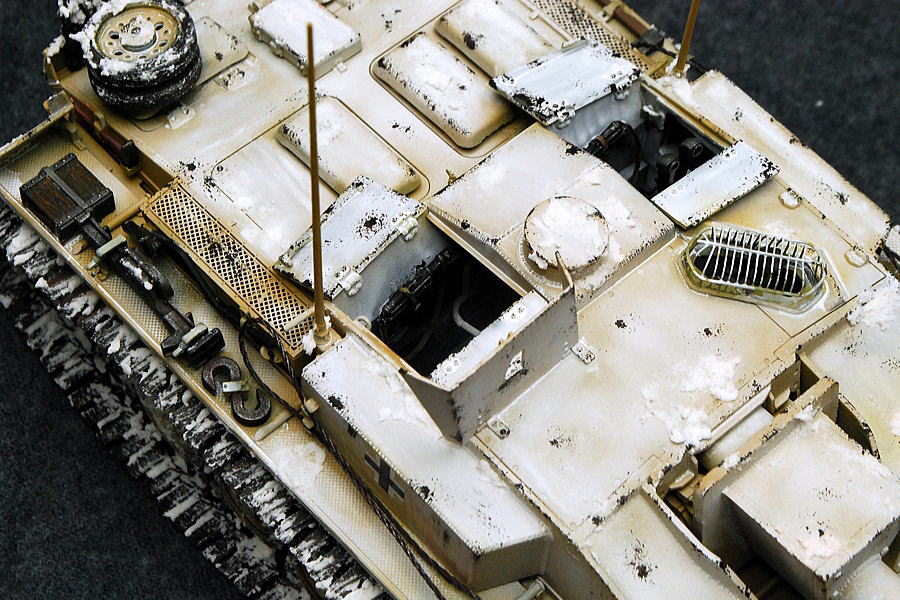 The places which can be opened were manufactured, opened as much as possible and open-close movable. Since it is dark inside, we don’t need to care about the structure of this vehicle so much.
The places which can be opened were manufactured, opened as much as possible and open-close movable. Since it is dark inside, we don’t need to care about the structure of this vehicle so much.
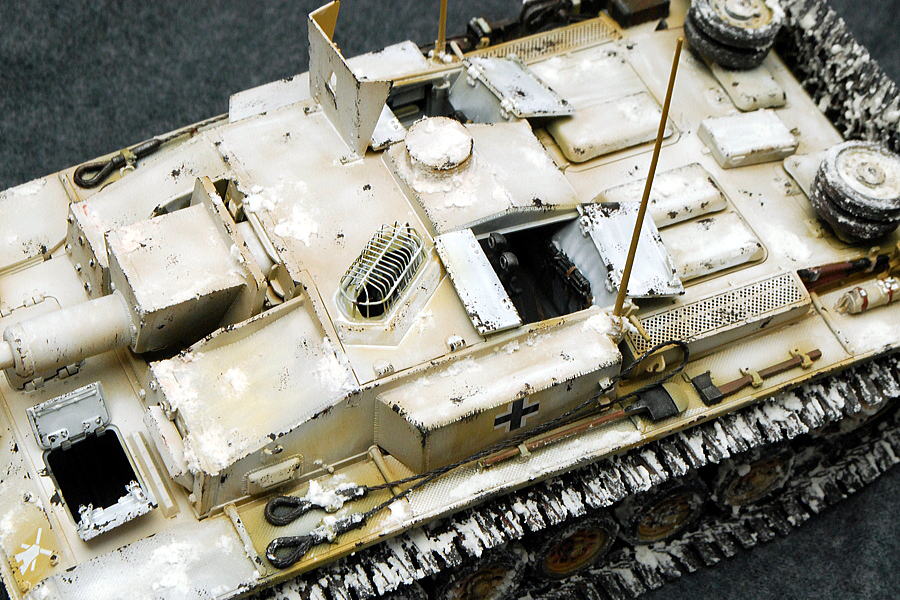 The wire net of hand grenade throwing in prevention like a birdcage is the feature of this kit. The vehicle’s upper surface is covered with snow in some places.
The wire net of hand grenade throwing in prevention like a birdcage is the feature of this kit. The vehicle’s upper surface is covered with snow in some places.
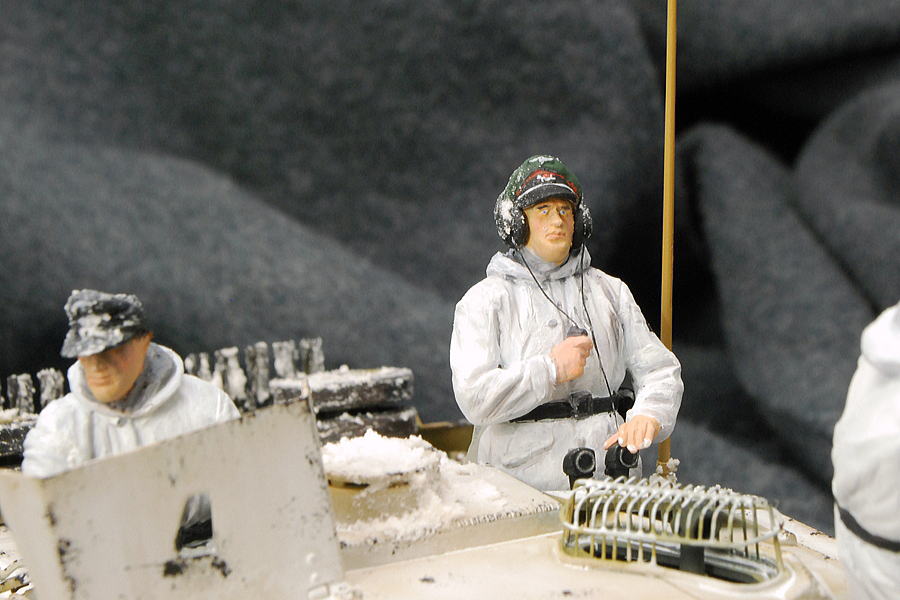 The headphone code loosened the battery power cord, picked up thin copper wire, and connected to the headphone and receiver.
The headphone code loosened the battery power cord, picked up thin copper wire, and connected to the headphone and receiver.
They are fighting in the arctic cold of Russia; their complexion seems to be cold as, for this time, blue, which is transparent cold like ice; how are they?
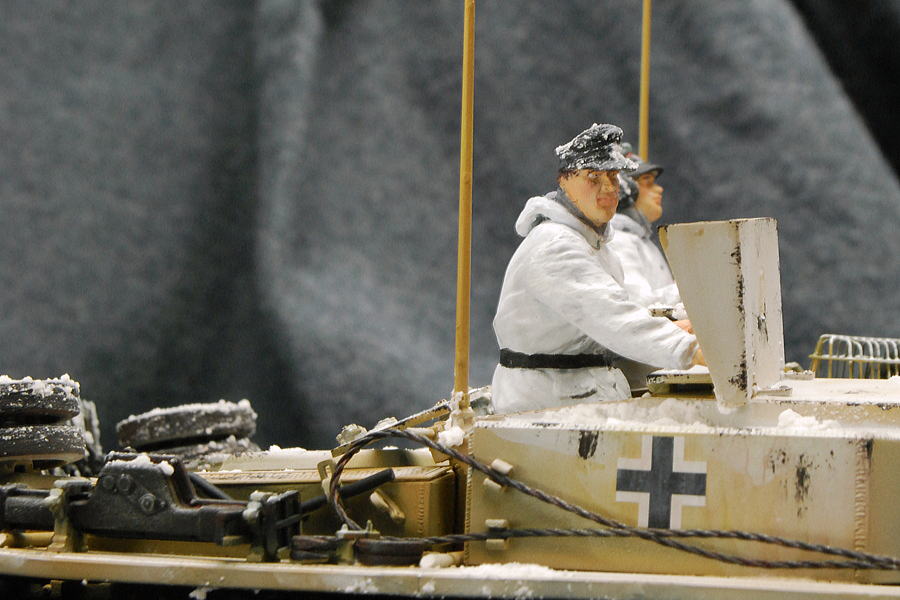 Powdery snow is attached to the field cap.
Powdery snow is attached to the field cap.
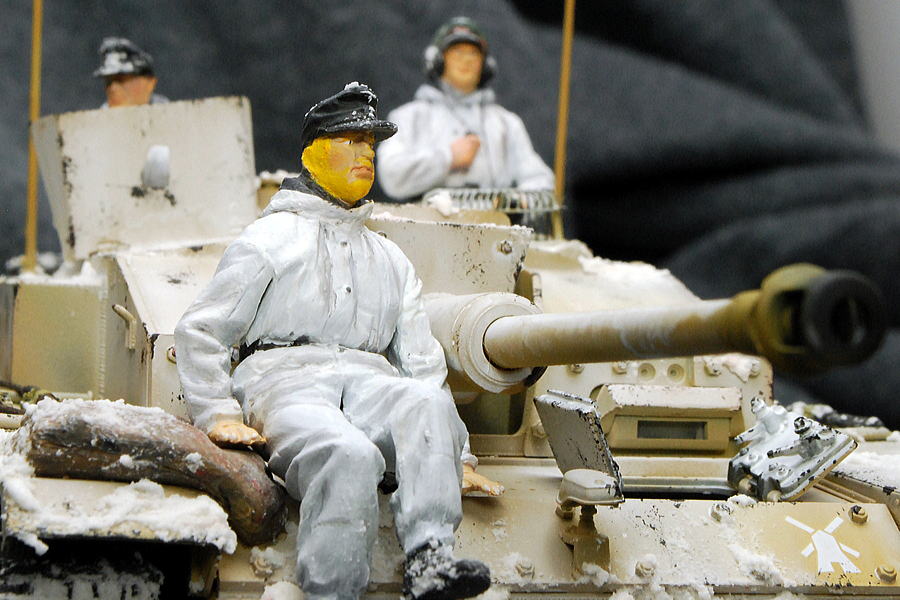 Is a mustache done too much? Painting is difficult for heavy white winter clothing. If a shadow is written much, it becomes dirty. Since it was modest in the winter camouflage of a tank, I considered that the crew uniform suits pure white.
Is a mustache done too much? Painting is difficult for heavy white winter clothing. If a shadow is written much, it becomes dirty. Since it was modest in the winter camouflage of a tank, I considered that the crew uniform suits pure white.
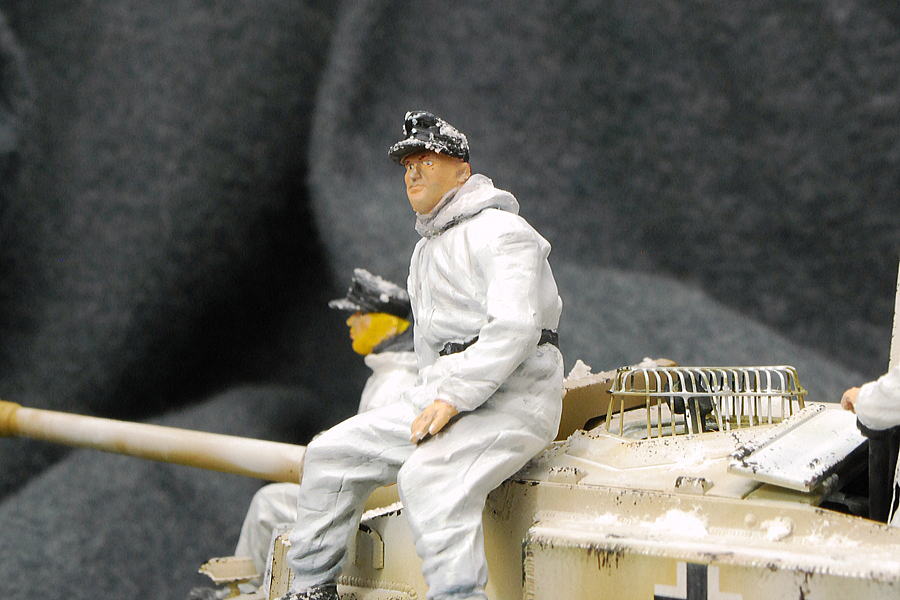 All figures finish with oil painting. It’s a demerit for quick temper; it’s one of the merits for the busy person that oil painting is not dry in 2 or 3 days; we can keep the color wet until tomorrow. Blending the shadow part is better finishing since the drying time is extended.
All figures finish with oil painting. It’s a demerit for quick temper; it’s one of the merits for the busy person that oil painting is not dry in 2 or 3 days; we can keep the color wet until tomorrow. Blending the shadow part is better finishing since the drying time is extended.
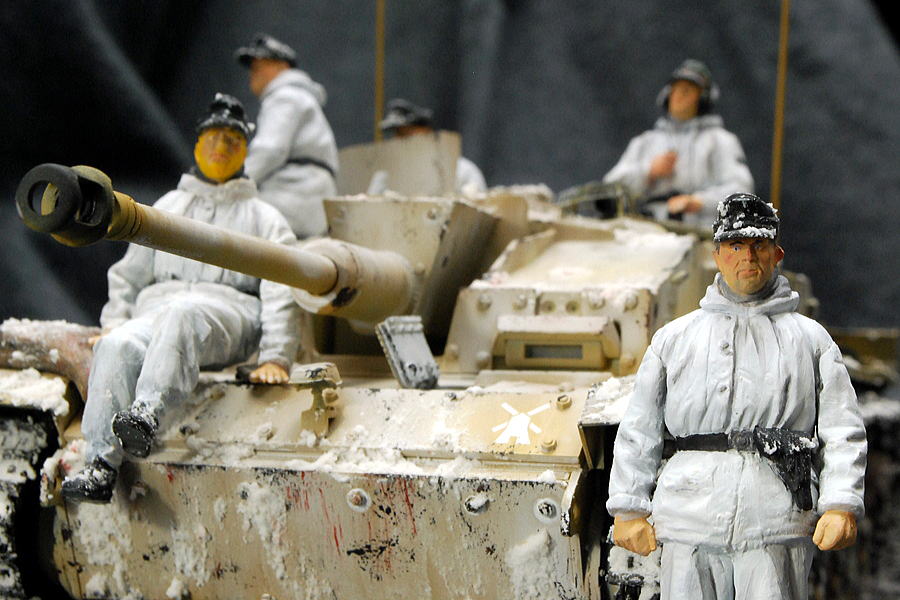 A right-side middle-aged soldier is in the abstraction in front of the white plain in Russia, which continues to nowhere. I suppose I can do a comparatively good painting job on this face.
A right-side middle-aged soldier is in the abstraction in front of the white plain in Russia, which continues to nowhere. I suppose I can do a comparatively good painting job on this face.
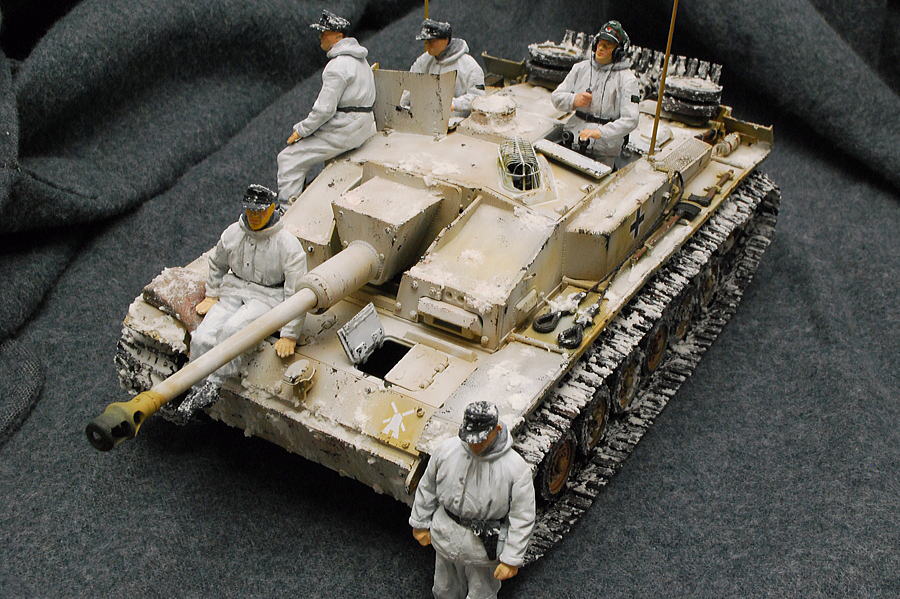 There is a capacity of four self-propelled anti-tank guns; one person is another tank’s crew. Figures are unstable only by having put on the vehicle. I feel that lively motion has come out compared with only vehicles.
There is a capacity of four self-propelled anti-tank guns; one person is another tank’s crew. Figures are unstable only by having put on the vehicle. I feel that lively motion has come out compared with only vehicles.
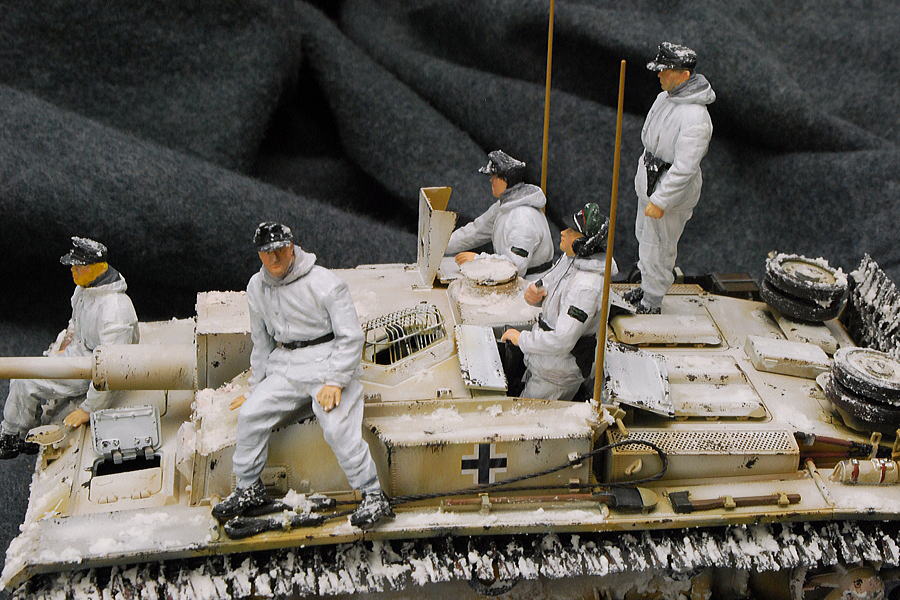 It seems all five crews do what they want to, relaxing or watching. Should each one of relevance be given next time? Some crew had attached the sleeve insignia, and some did not. It may be only an officer and a staff sergeant. I referred to the box art of this figure kit; only two persons have the insignia, and I added them on the sleeve in handwriting.
It seems all five crews do what they want to, relaxing or watching. Should each one of relevance be given next time? Some crew had attached the sleeve insignia, and some did not. It may be only an officer and a staff sergeant. I referred to the box art of this figure kit; only two persons have the insignia, and I added them on the sleeve in handwriting.
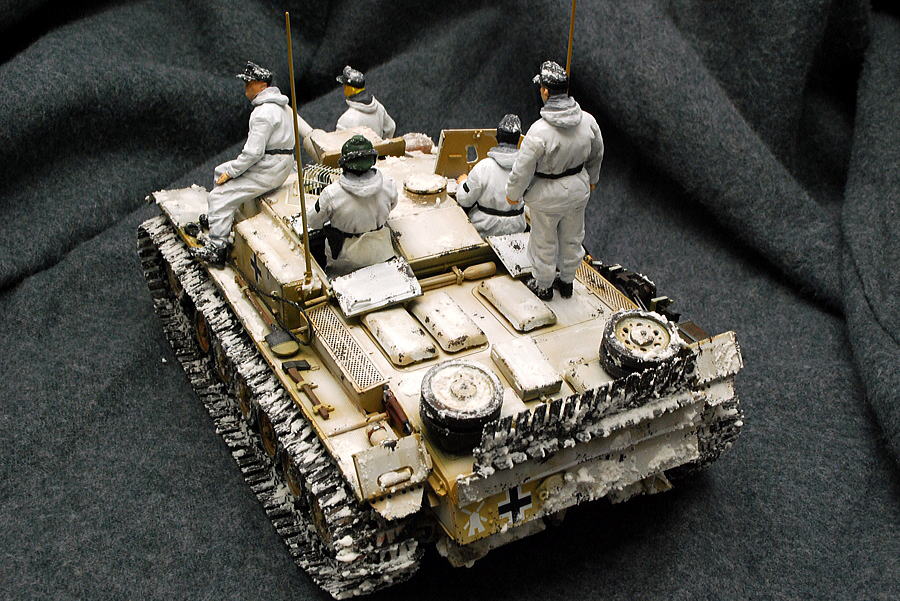 I like this photo shot very much. The marching atmosphere has come out. This kit has equipped with a particular type of snow caterpillar. I enjoyed modeling and painting very well.
I like this photo shot very much. The marching atmosphere has come out. This kit has equipped with a particular type of snow caterpillar. I enjoyed modeling and painting very well.
(05-October-2013)

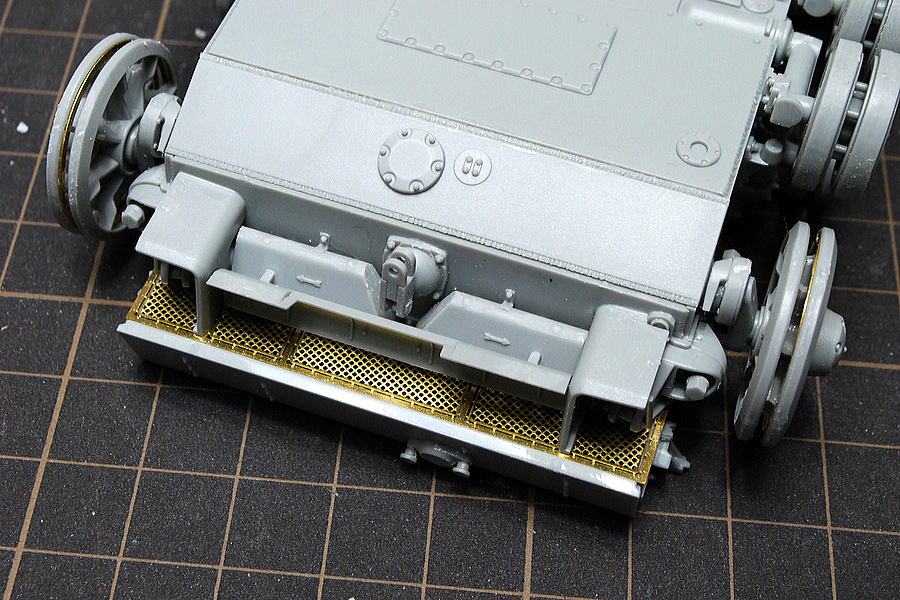
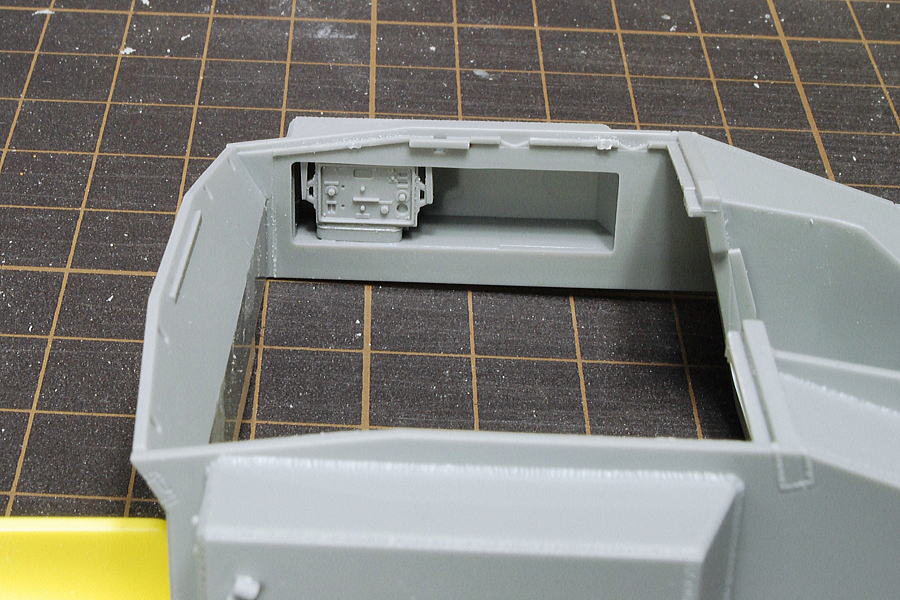
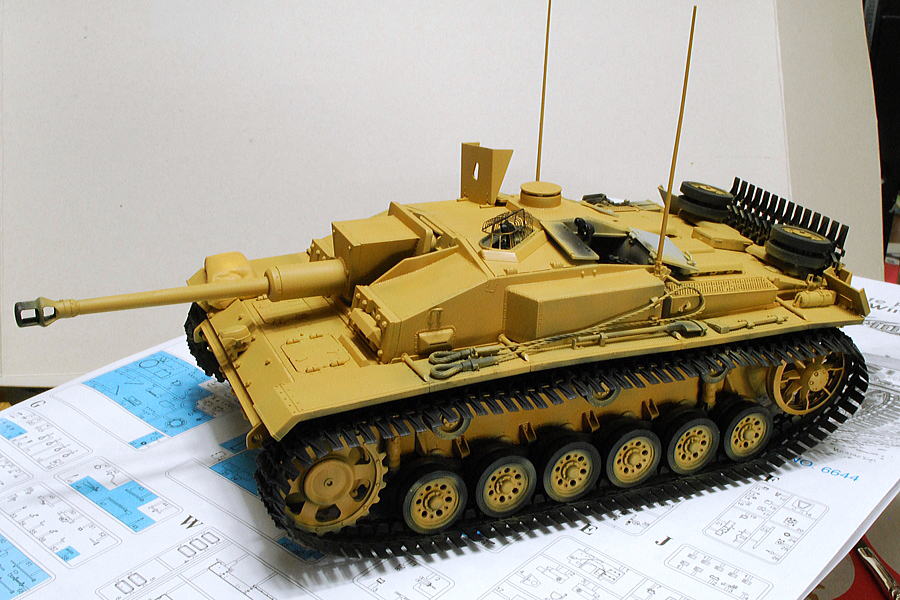


コメント